Sport Management News
The Right Touch
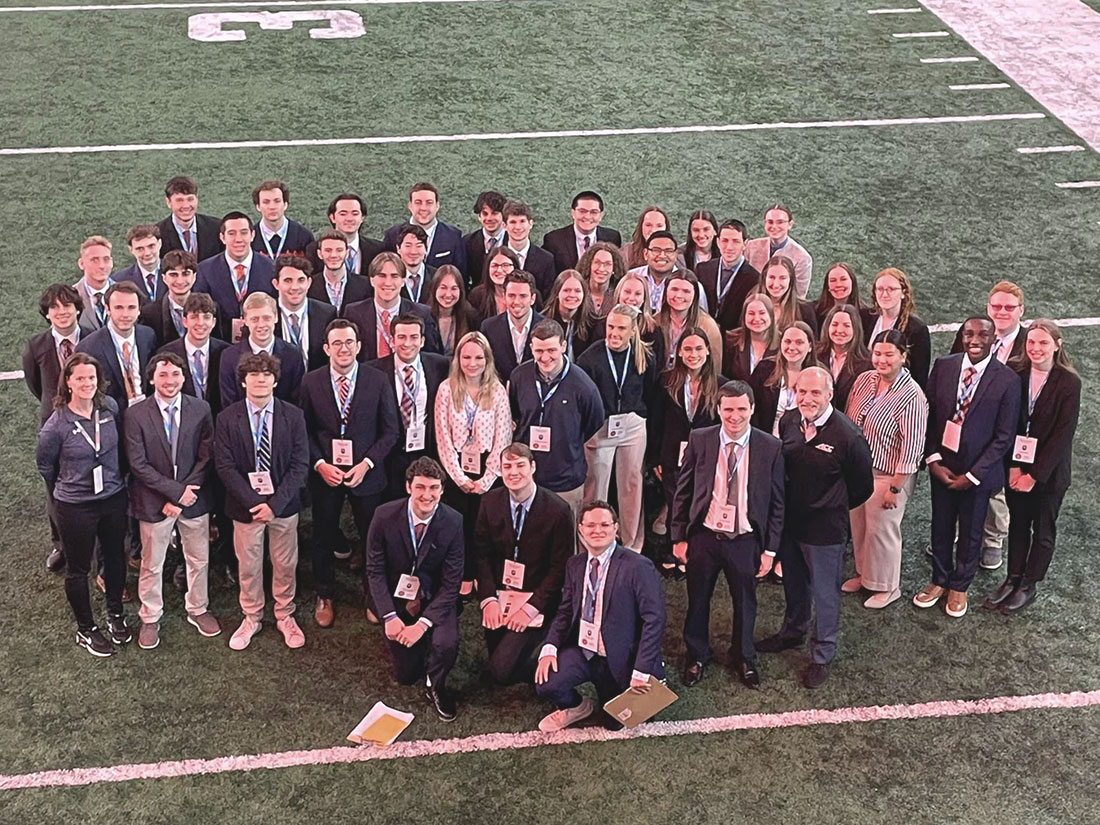
The Sport Management Club at Syracuse University raised $48,000 for Tillie’s Touch as a result of its 19th Annual Charity Sports Auction.
During the Syracuse men’s basketball game on Nov. 28, supporters purchased items and placed bids on sports memorabilia, electronics, jewelry, gift baskets, experiences, books, and trips, among other items. In addition to the in-person event, an online auction was held where online supporters placed bids on hundreds of items.
Tillie’s Touch strives to make children’s dreams of playing a sport possible while helping them to achieve academic excellence. Tillie’s Touch provides the necessary sports and/or school equipment for a child when their family is unable to do so.
Apex Entertainment served as the Title Sponsor for the 2023 auction.
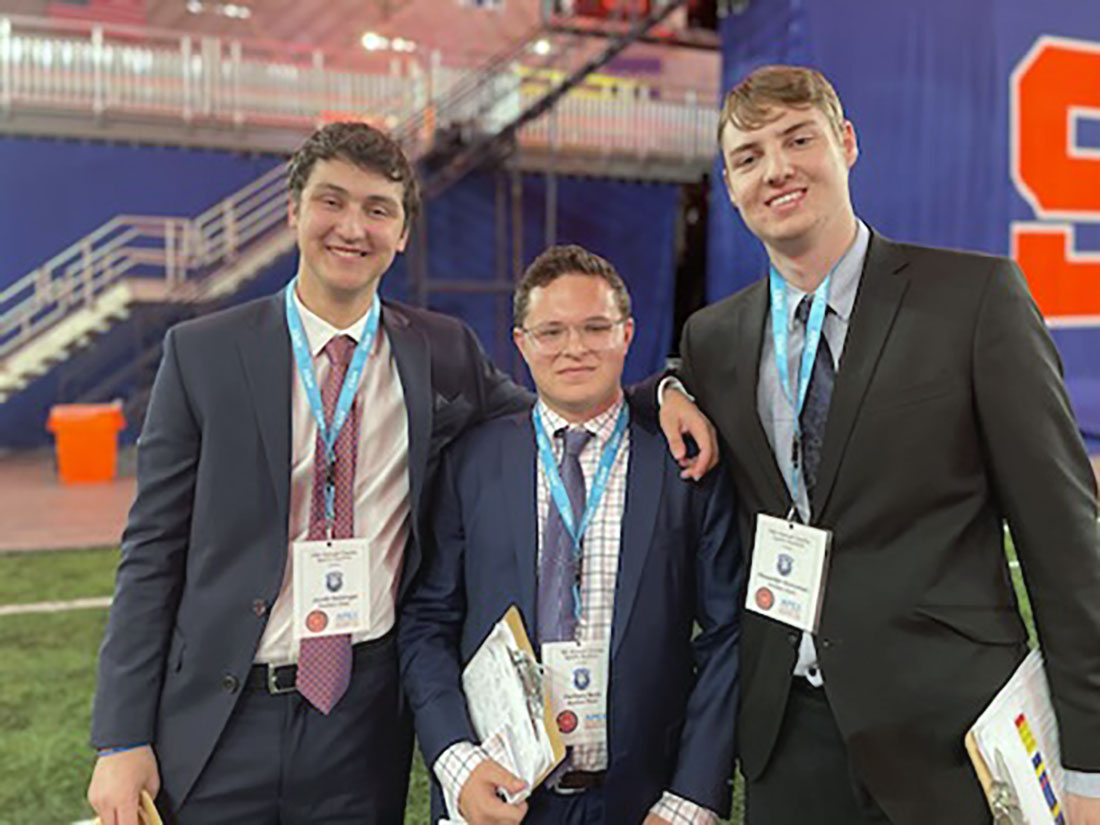
The SPM Club is a student-run organization in the Falk College of Sport and Human Dynamics’ Department of Sport Management.
Since its founding in 2005, the club has raised more than $712,000 for local charities. Previous beneficiaries of the club’s annual charity auction include Boys & Girls Clubs, Golisano Children’s Hospital, the Ronald McDonald House Charities of CNY, the Central New York SPCA, the Upstate Cancer Center, Special Olympics New York, Food Bank of CNY, the Salvation Army, Rescue Mission Alliance, American Diabetes Association, Make A Wish CNY, Meals on Wheels, the Jim and Juli Boeheim Foundation, McMahon/Ryan Child Advocacy Center, and Vera House.
“Our Sport Management Club was founded on the principles of teaching our membership the value of civic engagement, community service, and social responsibility through sports,” says Michael Veley, Rhonda S. Falk endowed professor and director of Sport Management, who also serves as the organization’s faculty advisor. “The countless hours of dedication by these students to ensure that the proceeds from our charity auction would benefit our community is extremely gratifying.”
The Sport Management Club meets weekly during the academic year. For more information about the annual Charity Auction, visit X/Twitter, Facebook, Instagram, or the Charity Sports Auction website.
To promote the auction, student organizers appeared on WSYR’s Bridge Street program, WSYR NewsChannel 9, and WTVH/CNY Central.
Paying It Forward
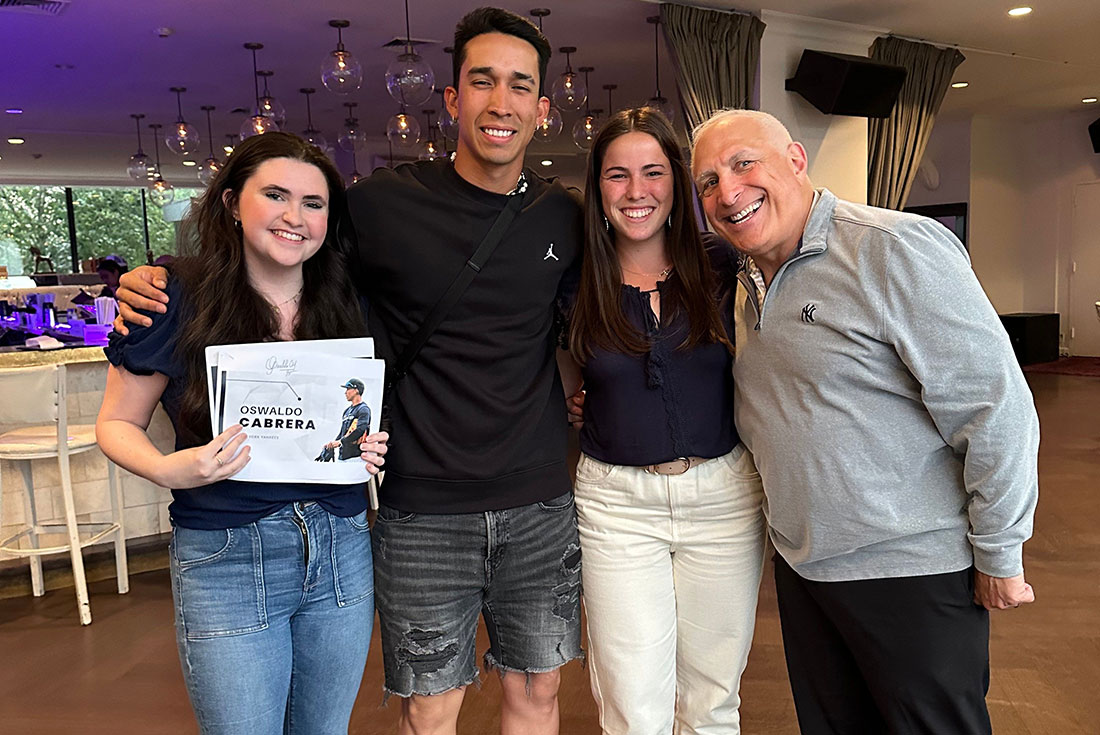
Himself.
Steiner, who graduated from Syracuse University in 1981 and is now chairman of the Sport Management Advisory Council, grew up in a low-income neighborhood in Brooklyn, New York. His father left the family when he was 5, and while his mother, Evelyn, operated a beauty salon, it was a struggle financially for her to raise Brandon and his two brothers.
Despite a low SAT score, Steiner convinced a Syracuse admissions counselor that she “will never regret letting me in,” he wrote in his 2012 book “You Gotta Have Balls.” Steiner was admitted and his family did receive enough financial aid to pay for tuition, but there was still one problem: He didn’t have any additional money to live from day to day.
Steiner has never forgotten those days. Working with Falk College Assistant Dean for Advancement David Salanger and Sport Management Chair and Director Michael Veley, Steiner has created the Brandon S. Steiner Sport Management Student Support Fund that “supports health, housing, education, and overall wellbeing of Syracuse University undergraduate students enrolled in the Department of Sport Management in Falk College.”
“Look at a kid like me,” Steiner says. “I was willing to work full-time in college; otherwise, going to Syracuse probably wouldn’t work. If I just went up and wasn’t willing to work full-time–and I’m not talking about work study, I’m talking about a 40-hour-a-week job–I don’t think I could have made it up there.
“But I don’t know if that can work in today’s age,” he continues. “I want to focus on poorer kids who have something special going on and if we can get them additional help, they would come.”
The Steiner Student Support Fund awards support for a single academic year, and students can apply for funds by completing this survey. A student can’t be awarded funding more than twice.
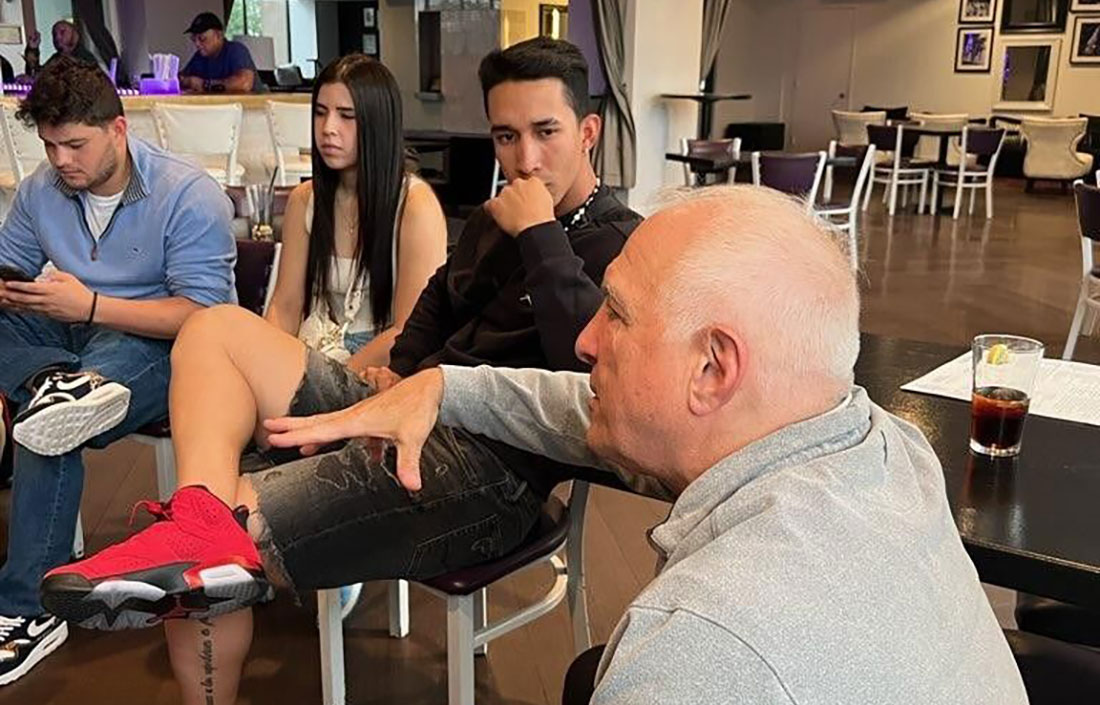
With the rigorous demands of the program, it can be difficult for students to work the kind of hours that Steiner worked as a student to help pay for food, housing, fees and supplies, and other critical student needs. Steiner says he hopes his fund will help all students, but particularly underrepresented students who, like Steiner, might need support but are future stars in the sport industry.
“We have to make it easier for them to come here,” Steiner says. “And the reality is, the teams, leagues, and players are all diverse and we want to be diverse with the students we’re sending into the industry.”
At Syracuse, Steiner attended the Whitman School of Management because his mother suggested he major in accounting. Utilizing his work ethic, ingenuity, and ability to make an impression on people, Steiner served as founder and chairman of Steiner Sports Marketing and Memorabilia for more than 30 years.
In 2019, he launched two new companies: The Steiner Agency, the nation’s premiere independent athlete procurement source, and Collectible Xchange, an online platform for fans, collectors, store owners, celebrities, athletes, and teams to buy and sell collectibles.
The Steiner Student Support Fund is the latest way Steiner has given back to Syracuse University and Falk College’s Sport Management program, which he played a key role in creating more than 20 years ago. He says attending Syracuse “gave me the biggest break I ever got,” and he wants his fund to provide opportunities for students like him who will become the next generation of sports marketing trailblazers.
“There’s nothing like the feeling of pride you get from passing the torch to the next generation,” Steiner wrote in his book. “I can’t wait to see all the innovative products they come up with.”
In addition to the Steiner Student Support Fund, there are other opportunities and awards available to students in Falk College. Please visit the Awards and Scholarships page on the Falk website for more information on how to apply.
‘An Exciting Time’
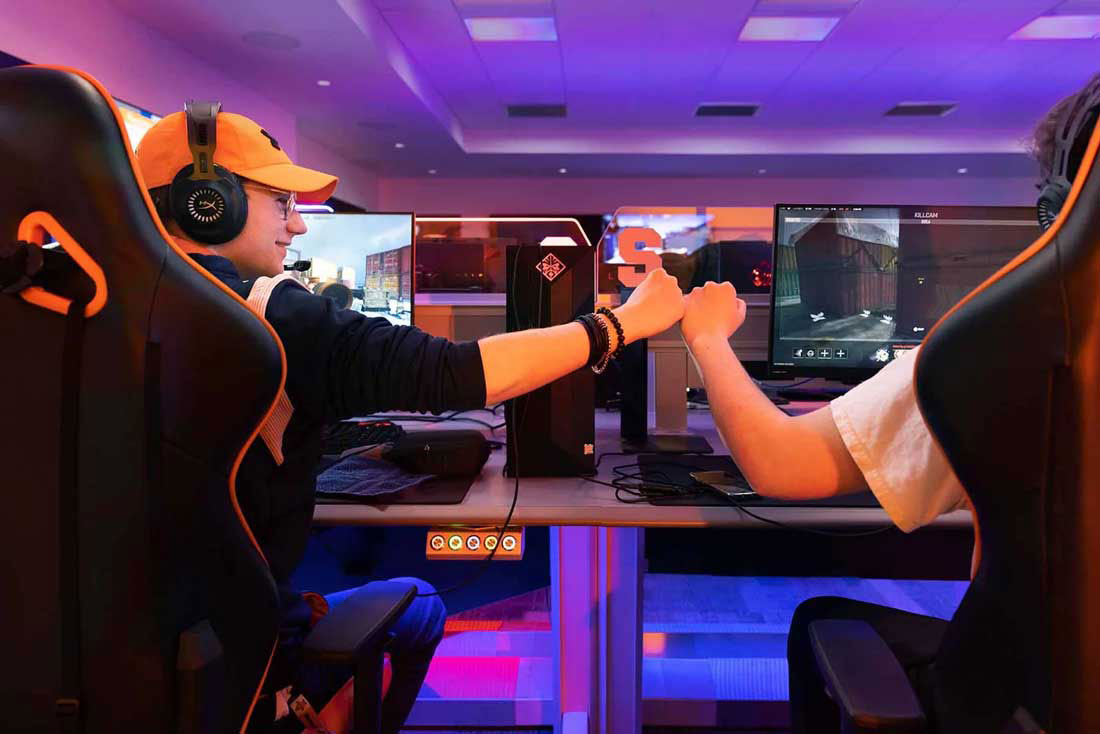
Syracuse University launches its new esports communications and management program in 2024. This first-of-its kind offering at a major university is a partnership between the Newhouse School of Public Communications and the Falk College of Sport and Human Dynamics.
As we get ready for a big year for esports at Syracuse, program director Joey Gawrysiak looks ahead at three trends for the industry in 2024 – and beyond.
“We are going to build on the strong foundation of academic excellence at Syracuse while making sure our esports students achieve competitive success and learn the skills needed for a rewarding career in a thriving field,” Gawrysiak said.
“There is so much potential here – it’s an exciting time to be involved in esports,” he added.
The Big Business of Esports
According to Yahoo Finance, the esports industry was valued at $1.39 billion in 2022, and the value is expected to grow by roughly 16% each year through 2030. Increasing accessibility and inclusivity in esports, especially in mobile and PC gaming, will account for a large portion of this growth, especially with the development of 5G connectivity.
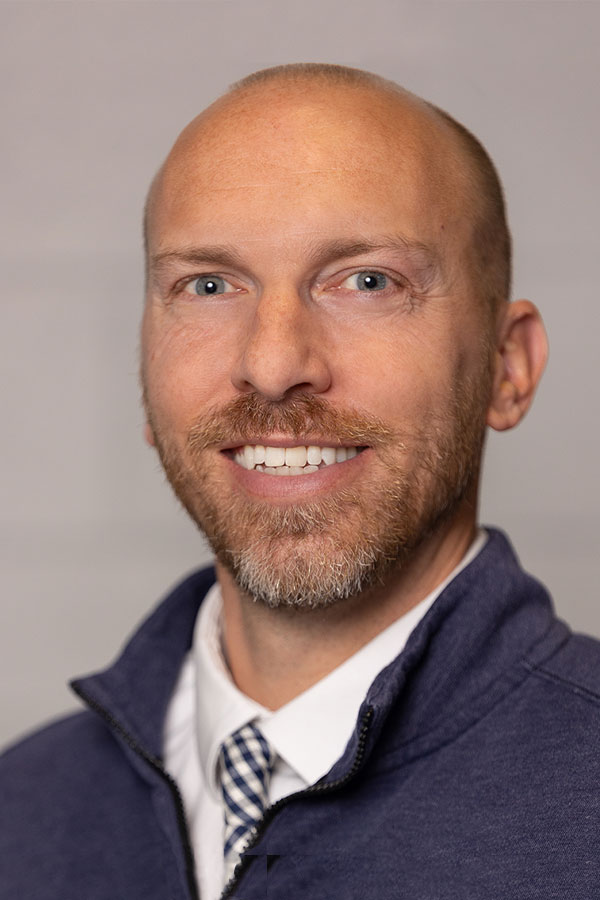
Opportunities Abound
Collegiate esports are growing in terms of number of programs and the size of programs at each school. A record 82% of colleges or universities with esports programs reported an increase in the size of their program in 2022, according to a study by Esports Foundry. As these programs grow and new programs start at institutions around North America, student engagement opportunities and job openings should expand, too.
Establishing a Foothold
More than half of all college programs have been around three years or more, a sign that the scholastic esports ecosystem is rapidly maturing and becoming more sustainable, according to Esports Foundry. This shows recognition by administrators and educators who are investing in esports programs as destinations for students interested in career opportunities.
Gawrysiak arrived from Shenandoah University, where he developed one of the first esports degrees in the country, to establish the new program at Syracuse. Falk boasts thriving sport management and sport analytics programs, along with scholarship in public health, social justice and equity.
Newhouse has been a leader in the space as one of the first schools in the country to offer courses in esports and communications.
“I’m looking forward to what’s in store at Syracuse and having the chance to work with students thinking about a career in esports,” Gawrysiak said. “We’re going to create a dynamic, inclusive environment and strong sense of community in our program.”
A Winning Team
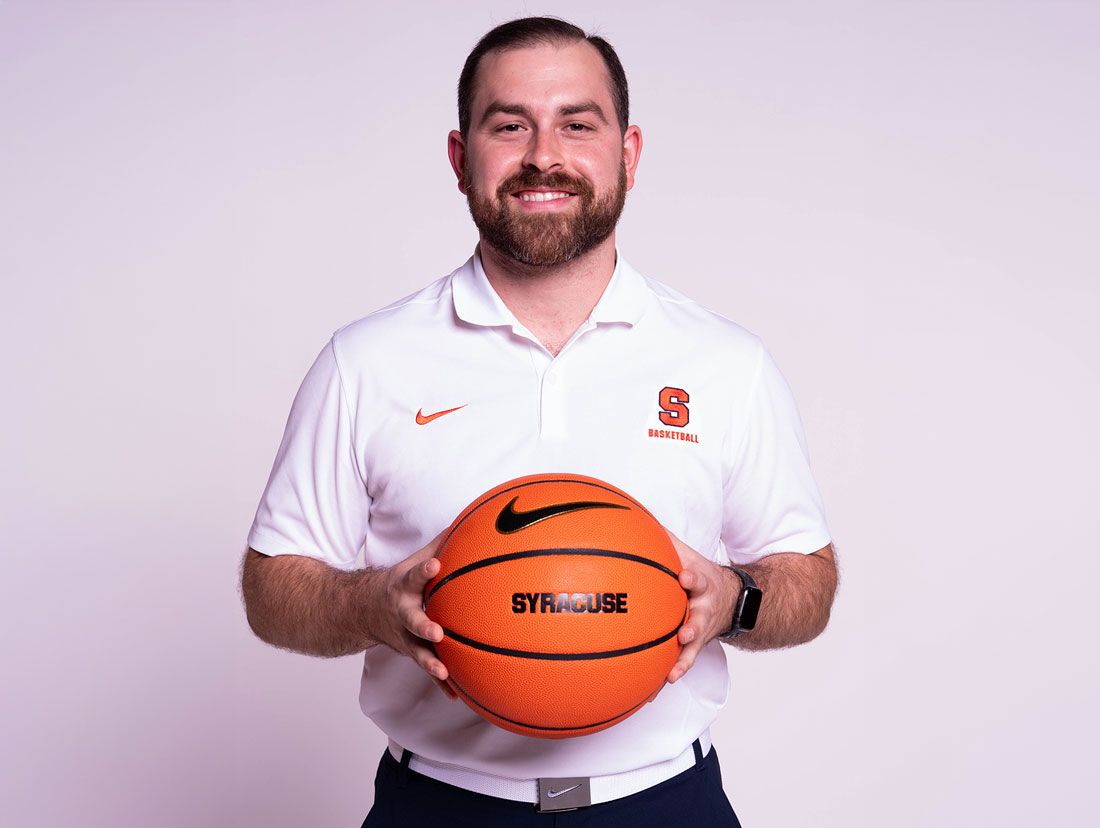
As the associate athletic trainer for the Syracuse University men’s basketball team, Mike Mangano says he’d much rather spend his time preventing injuries than treating them.
That’s why Mangano has fully embraced the partnership between the University’s Athletics Department and the Department of Sport Management in the Falk College of Sport and Human Dynamics that’s allowing nearly 50 students majoring in sport analytics to provide real-world data to assist the coaching and athletic performance staffs of 11 of Syracuse’s men’s and women’s athletic teams.
The specifics vary from sport to sport, but in general most students are collecting performance data from the student-athletes’ wearable devices; analyzing that data from training, practices, and games; and interpreting that data to provide insights to coaches and staff.
When Mangano was an assistant athletic trainer for the men’s soccer team, he says that kind of data helped coaches determine the optimum workload for each player. Once the players started maintaining that weekly goal, soft tissue injuries decreased.
“So, for me, it’s great. I don’t have to do as much work,” Mangano says, laughing. “But at the same time, my philosophy is, do the work on the front end. If you can prevent injuries–and obviously you can’t prevent them all–but if you can prevent most of the injuries and add that kind of education for the student-athletes and coaches, then (the analytics) are working for us.”
The genesis of this partnership between athletics and analytics can be traced to Mangano’s interest in analytics and sport performance and conversations he had with Francesco Riverso, the program manager for the Sport Analytics program and a former soccer standout at Le Moyne College in Syracuse. Riverso encouraged Mangano to earn his Certificate of Advanced Study in sport analytics, which Mangano did last year, and they arranged for sport analytics students to start collecting, analyzing, and interpreting data for the men’s soccer team in 2022.
Sport analytics students also started working with the women’s lacrosse team last season. The men’s soccer team won the 2022 Division I national championship, while the women’s lacrosse team reached the 2023 Division I Final Four.
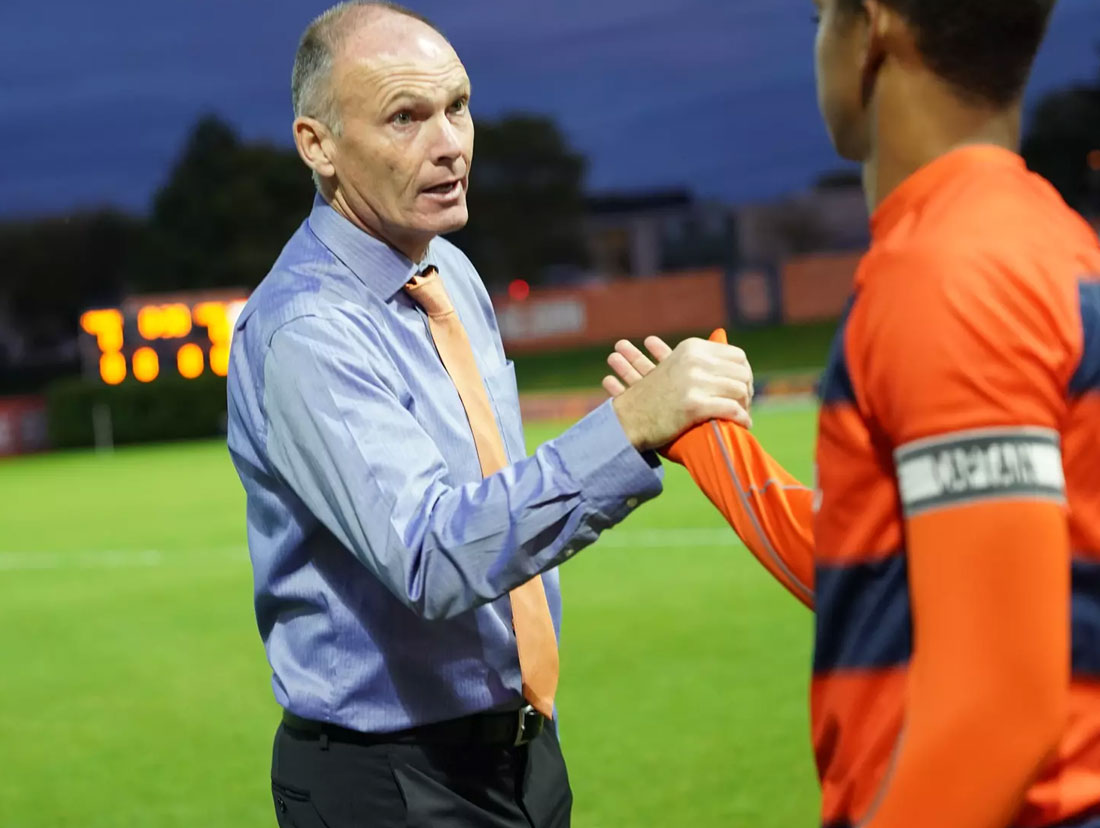
“The role of our student analysts has been integral to our program’s success,” says men’s soccer head coach Ian McIntyre. “The student analysts are responsible for collecting and interpreting all GPS data, and to provide detailed post-match and post-training reports. These reports are presented to the coaching staff with concise information that enables us to make objective decisions around training load and managing student-athletes’ minutes in games.
“In addition to the GPS data, the student analysts provide half-time and post-match reports of pre-determined categories that allow us to see how we are playing, and how we can make the necessary adjustments,” McIntyre adds.
The partnership expanded this academic year to include the following teams: women’s and men’s basketball, field hockey, football, ice hockey, women’s and men’s lacrosse, women’s and men’s soccer, softball, and track and field. Tommy Powell, assistant provost for student-athlete academic development at Syracuse, says the sport analytics students are available to all athletic teams and the athletic department plans to make this a long-term arrangement with the Sport Analytics program.
“This collaboration represents an exciting opportunity to merge the worlds of athletics and data analysis, further enhancing our ability to make informed decisions and drive success both on and off the field,” says Syracuse Director of Athletics John Wildhack. “Together, we will harness the power of analytics to gain a competitive edge and propel our student-athletes and teams to new heights.”
Rodney Paul, director of the Sport Analytics program and a professor in the Department of Sport Management, says the partnership provides sport analytics students with a one-of-a-kind opportunity to apply the data analytics skills they’re learning in class.
“It not only provides the students with real-world experience in sports but gives them the chance to see it applied directly to the University sports teams they already love and support,” Paul says.
There are currently 10 students working with the men’s basketball team, and Mangano says that group includes freshmen, sophomores, juniors, and seniors so they can “continue to keep that ladder going” in future seasons.
“For the students, they get real-life experience and can build their professional skills and resume by learning how to deliver that information to a real person,” Mangano says. “And it’s huge for us because, practically, we can’t pay 10 analytics people to come in and work us.”
To get a better understanding of this partnership, we talked to three sport analytics students about their roles with the Athletics Department. Here are their stories:
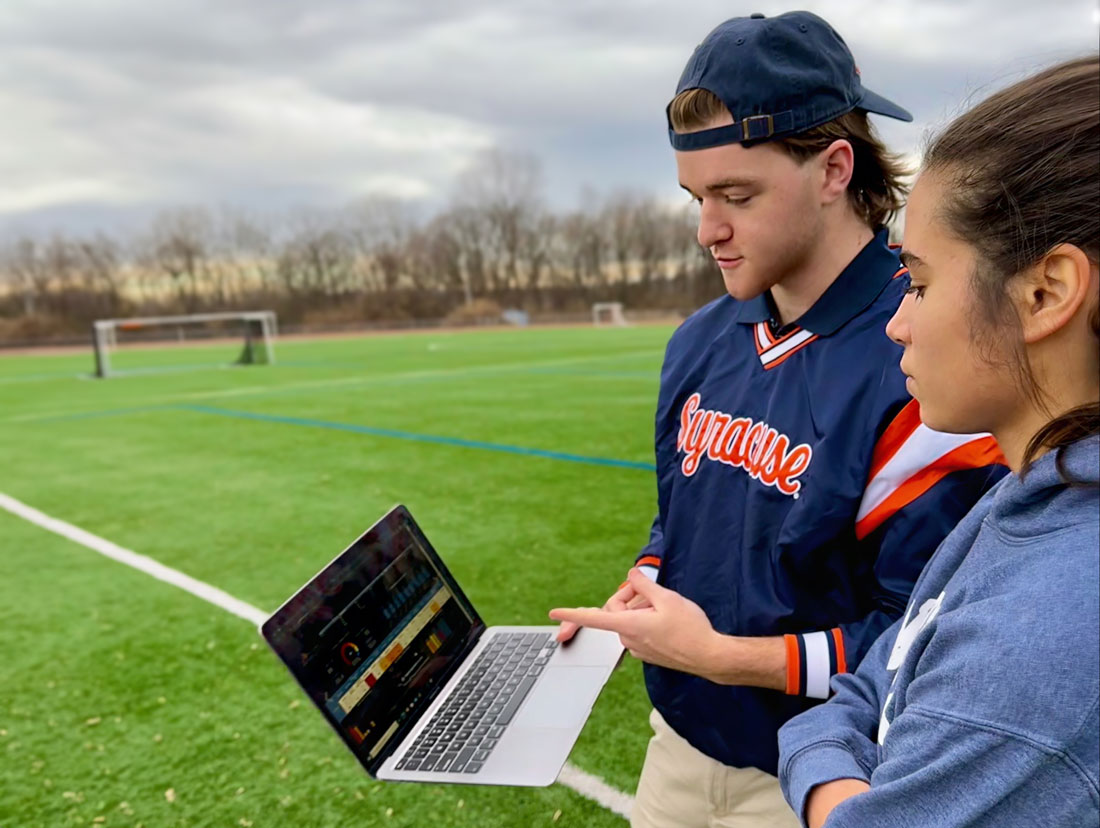
Dan Griffiths: Track and Field
Griffiths is a sophomore who was born in England and moved the United States with his family when he was 5. They moved again to Boston when he was 12, and in high school he participated in soccer and track and field (the decathlon and 400-meter dash were his two best events).
When he arrived at Syracuse University, he quickly learned that sport analytics majors are encouraged to apply for internships. With the partnership between athletics and analytics growing, and because of his love of track and field, Griffiths reached out to head coach Brien Bell to ask if he could work with the track and field and cross country teams. The teams hadn’t previously used a performance data analyst, and Bell welcomed Griffiths aboard and gave him the freedom to explore how to collect and analyze the data.
“My whole goal was to try to take their training data and make some predictions about how they can optimize their training to prevent injuries, make sure they’re not overtraining, and make sure they’re peaking at the optimal times at the end of the season for those big competitions,” Griffiths says.
When Griffiths started, the teams didn’t utilize a data-gathering system, but the track and field and cross country student-athletes were using Garmin wearables to track their own data. So, Griffiths built his own application and a tool that can transport all their data into his application, which then creates spreadsheets he can use to analyze that data.
“It’s not like an app you can download from the app store. It has an interface only I can see and it’s in partner with Garmin, the maker of the watches and owner of the data,” Griffiths says. “I was in contact with them for two weeks, figuring out how I can get connected and use their API (Application Programming Interface) and integrate that into my application.”
As an example of how he uses the data, Griffiths cited a female long-distance runner whose hardest training month based on heartrate was July, but as she built up her distance in the fall she was losing speed because her heartrate wasn’t at the optimum level. Based on the data Griffiths collected, she altered her training to reduce her miles but increase her heartrate, and that increased her speed and resulted in a personal best in late October.
“This is exactly why I came to Syracuse,” Griffiths says. “When I was on the tour (of campus), the tour guide said that sport analytics gets to work with some of the teams, and I thought the basketball team and the football team, and that’s going to be awesome.
“I didn’t really think I would be able to do it for the track team, and I didn’t see it as a possibility back then,” he continues. “But after my first year, I was very committed to being a part of the team and I saw that I could have this opportunity as long as I had the initiative to take it on myself.”
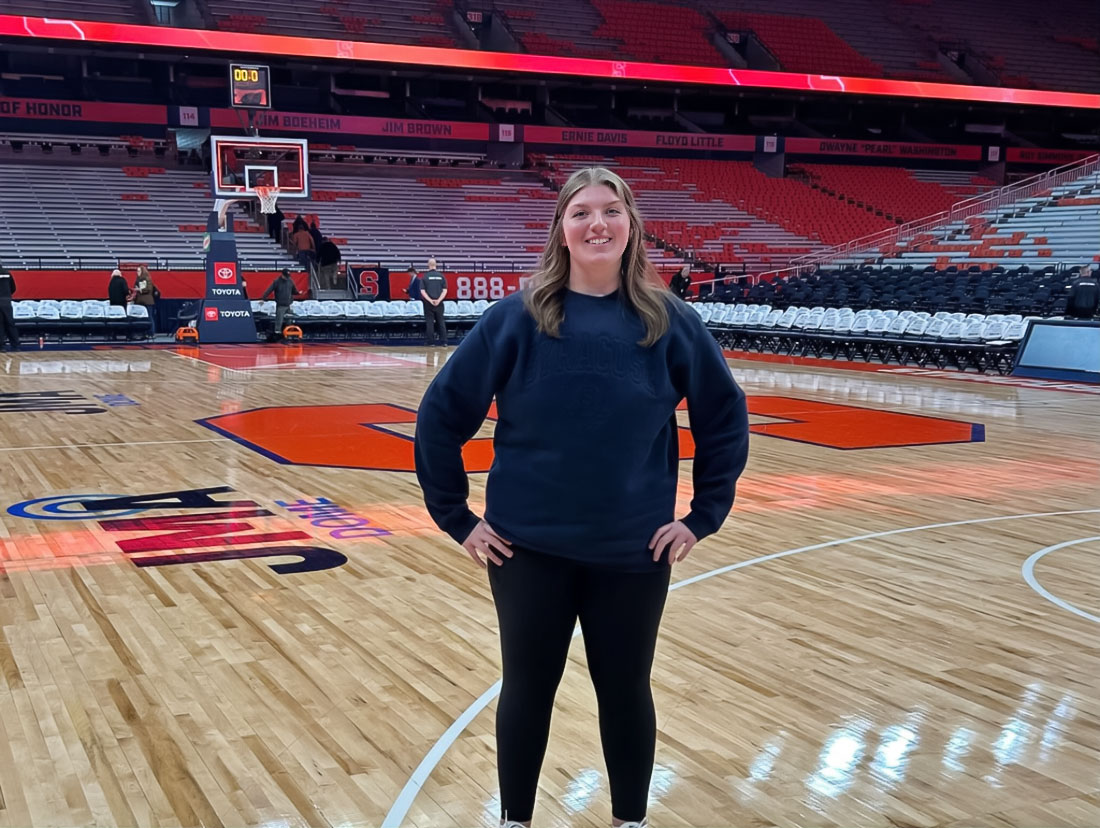
Danielle Napierski: Women’s Basketball
Napierski is a sophomore from Upper Saddle River, New Jersey, who’s a dual major in sport analytics and mathematics. As she was presented with this internship opportunity, Napierski had several reasons why she preferred the women’s basketball team.
“The coaches were open to having students who were passionate about working with this type of data metrics and analysis, and this was a perfect opportunity to start utilizing my knowledge and applying what I learned in the classroom,” she says. “This team is also a great community because the coaches are very flexible, appreciative, and open to anything that can help the team out.
“Lastly, I wanted to change the ratio of how men’s sports get the majority of the attention because these women work extremely hard to be where they are today and deserve recognition for their talent,” Napierski adds.
Napierski started working with the team in December 2022 with a sport analytics graduate student and they tracked the team’s number of passes per possession for each game. Over the summer, she had an internship in a collegiate baseball league and one of her co-interns was the current head manager for the women’s basketball team, senior sports analytics major Hayden Wasserman, who told Napierski that the team was looking to expand its analytics crew.
Once August rolled around and the team started practicing again, Wasserman reminded head coach Felisha Legette-Jack of Napierski’s interest in a career in sport analytics, and Legette-Jack invited Napierski to join this year’s team. To collect data, Napierski attends two or three practices a week, spends about five hours per week rewatching practices, and rotates with other managers at games collecting live statistics from Syracuse and its opponents.
“When the women are scrimmaging during practice, we create shot charts that we later put into (the computer program) RStudio and report back to the coaches so they can see how each individual is shooting from everywhere on the court,” Napierski says. “We do the same thing when we create scouting reports for our upcoming opponents, just so we can sense where each player likes to shoot and how efficient each player is.”
Napierski says her career goal is to work for an NBA or Major League Baseball team, or for either league. She grew up playing basketball, but switched to softball when she was older and enjoys working with both sports.
“Being a student manager for the (women’s basketball) team and working with data frequently will help me achieve my goal because any analytics position in any field looks for the same skillset in their applicants,” she says. “I have two more years of classes that will expand my knowledge of the industry, and this current position is the foundation of seeing how I can perform in this field and how I can grow for future full-time positions.”
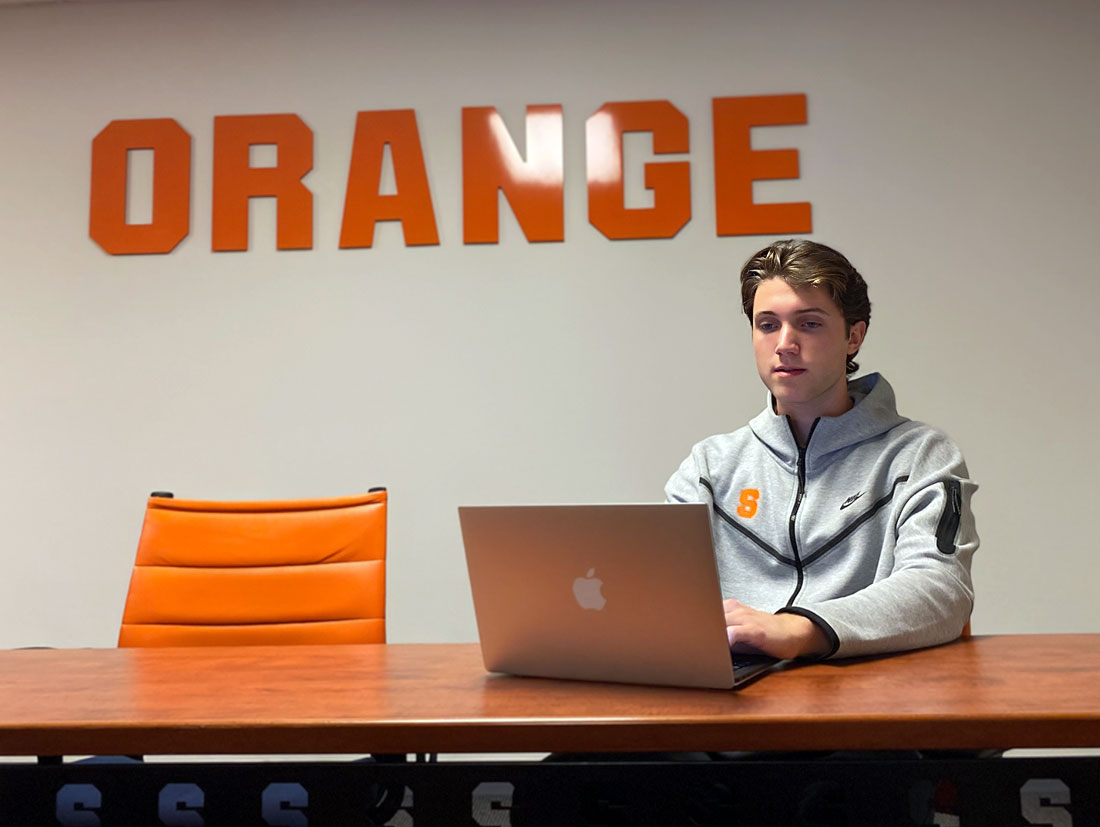
Caden Lippie: Women’s Lacrosse
A sophomore from Beverly, Massachusetts, Lippie has played soccer and ultimate frisbee in high school, and basketball in recreation leagues. Lacrosse wasn’t on his radar until Riverso sent out an email saying that the women’s lacrosse team was looking for sport analytics students to help analyze data from the student-athletes’ wearables.
That was last fall, and by late January Lippie was collecting and interpreting data, and by late May he was traveling with the team to the Final Four at the University of North Carolina. The team wanted to expand its use of training data because several players had suffered serious knee injuries in recent years and head coach Kayla Treanor was seeking information that might help inform their optimum workload.
“VX Sport is the wearable company, and they have units that the players wear for practices and games,” Lippie says. “Our role last year was to take those units and upload the data collected on them to a database on a computer and that data was sent to a representative from VX Sport who interprets that and goes over practice plans with the coaching staff.”
This year, Lippie will have an opportunity to expand his role as he’ll have access to practice and game footage and scouting reports and can explore using analytics in other ways to help the team.
“Incorporating sport analytics students into our women’s lacrosse program has been a game-changer, empowering us to make informed decisions and enhance our players’ performances,” Treanor says.
Lippie says he appreciates the flexibility that the team has provided, and the experience will be invaluable as he zeroes in on his career goals.
“What I appreciate most about this experience is that the (analytics) staff is relatively small compared to some of the other sports, so I’m able to do every aspect of analytics,” he says. “That’s the on-the-field analytics, the injury-prevention side, maybe less so with roster-building right now, but that could be an opportunity to explore with the team later. So, I’m able to look at all those different parts of analytics and hopefully decide what I like best and specialize in that. Or maybe incorporate all three.”
Syracuse University competes at the highest level of intercollegiate athletics, where the competition is fierce and winning is the bottom line. For both the teams that benefit from the analytics and the students who are doing the work, this partnership is truly a win-win.
“For us in athletics, it has helped build a bridge and expand our resources by utilizing their expertise,” Mangano says. “And for the students, the real-life experience doesn’t get any more real life than this.”
Podcast: Love From Tragedy

Julie Friend ’92 was a sophomore studying speech communication in the College of Visual and Performing Arts when Pan Am Flight 103 went down over Lockerbie, Scotland, on Dec. 21, 1988. Friend and her roommate, Beth, were sitting in Cosmo’s Pizza on Marshall Street when the breaking news alert came on television.
The two sought comfort and community at Hendricks Chapel, the spiritual heart of campus, mourning the tragic loss of life with the remaining students, faculty and staff members who hadn’t departed for winter break.
Friend would eventually become part of the first cohort of Remembrance Scholars and the traditions surrounding Remembrance Week.
“Remembrance Week is such a wonderful way to pay tribute to the students and their families, and to instill the impact of the event on Syracuse as an institution. Syracuse could have decided to quietly give out scholarships and not acknowledge the incident, but I’m so proud of the institution for going the other way, embracing the people impacted by this tragedy and embracing the impact this had on our campus community. By making this a celebration of the lives lost means their memories will last forever,” says Friend, who represented Gretchen Joyce Dater.
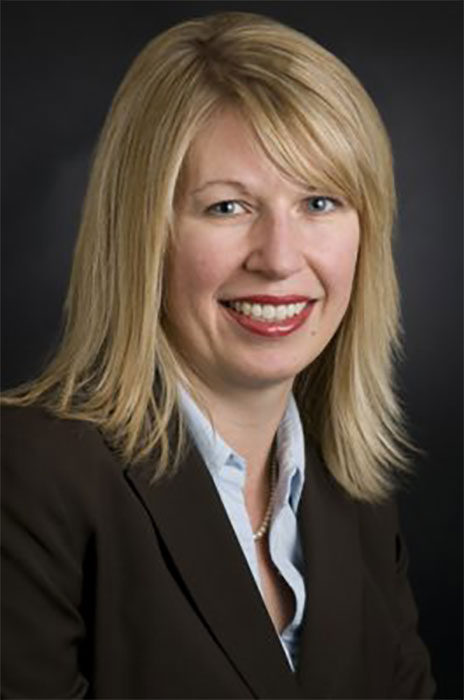
“Look back. Act forward.”
Those words influence how Syracuse University’s Remembrance and Lockerbie Scholars honor and celebrate the lives of the people who were killed during the terrorist bombing of Pan Am Flight 103.
This year marks the 35th anniversary of the bombing, which claimed the lives of 270 people, including 35 Syracuse students who were on their way home following a semester abroad.
Each October, the University community comes together during Remembrance Week events and activities—planned by that year’s cohort of Remembrance and Lockerbie Scholars—to memorialize the victims and further educate the campus community about terrorism.
The impact of being a Remembrance Scholar lives on in Friend and her fellow scholars.
Today, as director of global safety and security at Northwestern University, Friend developed a comprehensive, universitywide approach to international risk management, including for the university’s students who study abroad. She wrote the industry standard on how colleges and universities respond to the death of a student abroad.
“Absolutely there’s a tie between my work and my time as a Remembrance Scholar. I think about that whenever I’m dealing with a student in crisis abroad. Knowing the parents of the Pan Am Flight 103 victims experienced the ultimate tragedy a parent can experience when their student goes to college, I think about these family members too, and what they might be going through. It is important for me to put myself in the shoes of those parents so I can be the best I can at my job,” Friend says.
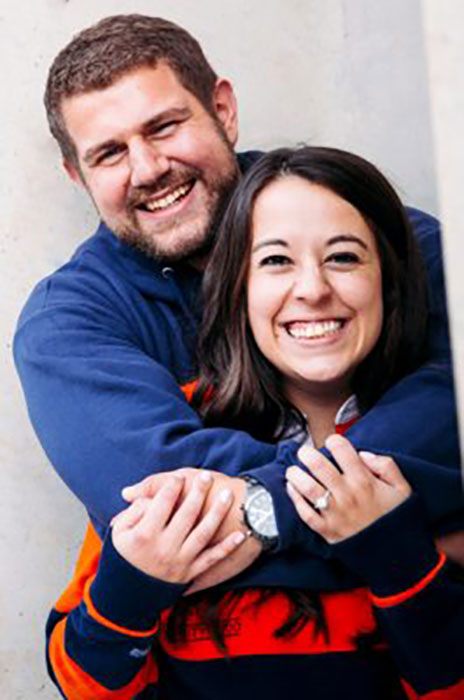
Hannah (Visnosky) Rafferty ’16 and Luke Rafferty ’16 firmly believe they never would have met were it not for the Remembrance Scholars program. The encounter had life-changing ramifications for both Hannah, who earned a sport management degree from the Falk College, and Luke, who earned a photography degree from the S.I. Newhouse School of Public Communications.
Today, the two are happily married and co-run a video production company, Filmiamo Productions, that tells the stories of successful companies, brands and individuals. They’re also raising their Orange goldendoodle, “Waverly,” named for the street where their Remembrance Scholars meetings took place inside Bird Library.
“When terrorists perform acts of terror, their goal is to instill fear and terrorize a community. The students that we represent didn’t get their chance at love, they didn’t get their chance at having an adulthood. While the terrorists were trying to harm and hurt people, Syracuse, in creating the Remembrance program, created something good out of this terrible situation. This allows us to talk about the victims of Pan Am 103 and honor their lives through us telling our story of how we met,” says Hannah, who represented Suzanne Marie Miazga.
“People of a certain generation remember Pan Am 103, but people of the newer generation don’t really know what happened that day. We get to provide that context and tell them that story to make sure those 35 Syracuse University students are always remembered and never forgotten. The student I represented [Alexia Kathryn Tsairis] wanted to be a photojournalist telling the types of stories Hannah and I do with our video production company. The Remembrance Scholar program gave me something powerful, and I’ve carried that with me well past graduation,” adds Luke.
On this “’Cuse Conversation,” these alumni reflect on the significant impact the Remembrance Scholars program had on them, share their stories of why they wanted to become Remembrance Scholars, and explain how they continue to honor the lives of the University students who died on the flight.
Friend recalls what it was like on campus in the aftermath of the incident and how there was an empty feeling when students returned to campus to start the spring semester. She also describes how powerful and emotional it was when the University marked the 30-year anniversary of the incident in 2018.
Hannah and Luke share how being Remembrance Scholars helped their Orange love story blossom. They also discuss the personal significance of both the Place of Remembrance—where each year the Syracuse community gathers for a candlelight vigil and rose-laying ceremony—and the Remembrance Wall—which features the names of the 35 Syracuse students who died.
Listen to the full story…
’Cuse Conversations: Look Back. Act Forward. The Profound Impact of the Remembrance Scholars Cohort
Hello and welcome back to the ‘Cuse Conversations Podcast. I’m John Boccacino, senior internal communications specialist at Syracuse University.
Julie Friend:
I think those of us who were in this support category, those of us who had interests in the world through our future career goals or our academic goals, we sort of took this as an affront like, “Those terrorists want to scare Americans, they want to keep us from doing things, they want to keep us from interacting with the world, and we are not going to let them do that.”
I remember being with people and we’re working on our essays to apply for our study abroad programs, and some people said to me like, “Aren’t you scared to go?” And I’m like, “Well, no. That’s what they want. We have to go. More of us need to go. We need to go and interact with people and learn their languages and try to close the divides that create the level of hatred that would prompt somebody to do what they did.”
John Boccacino:
Here on the ‘Cuse Conversations Podcast, we are honoring the 35th anniversary of Pan Am Flight 103. We are celebrating the lives of those victims. We are commemorating the terrorist attack, we are honoring the memories of the family members and the Syracuse University students who have been playing a very instrumental role in this as Remembrance Scholars.
And right now I am honored to welcome on Julie Friend of the class of 1991 here at Syracuse University. Julie currently works in higher education as the director of Global Safety and Security at Northwestern University in Chicago. She was in the first cohort of Remembrance Scholars back in 1990, 1991. And Julie, I want to thank you so much for making the time to talk to us today about your experiences.
Julie Friend:
It’s a pleasure to be here, John. As you know, I work in higher education and so Syracuse is never very far from my heart.
John Boccacino:
250,000 proud alumni around the globe have fond memories of their time on campus. And not to make a tough pivot, but this was a very challenging time obviously that day, December 21st, 1988, when the flight went down over Lockerbie, Scotland, it forever changed the trajectory of this institution of a small town in Lockerbie, Scotland that I’m sure many students on campus had never even heard of before this terrorist attack. Can you take us back to that fateful day when you were a sophomore back in 1988? What do you remember about the news? How did you hear about it?
Julie Friend:
It’s a funny thing about memory. I think my memories are correct. I’ve talked to some of my friends at the time and say like, “Is this what you remember too?” And it’s interesting as more time passes how harder it is to recall that time, but I still do have pretty distinct memories. And maybe part of it is because I’ve talked about it so often. But yeah, I was on campus. There weren’t that many of us left, obviously it was close to the end of the semester and I believe I was going home the next day as my roommate Beth was. And if my memory serves, we were in the pizza parlor, Cosmos. I don’t know if it’s still there now. And we were having pizza.
And if my memory serves, there was a news story about it. This is, of course, I always have to remind people, especially young people, this was before cell phones, before the internet. CNN was around, but you had to have cable in order to see it. And my roommate and I, we didn’t have cable, we just had the regular TV stations, but we were in the pizza parlor and there was a breaking news and there was an explanation about the crash. And then if my memory serves me, they started rolling names of the deceased. I think the news got a flight manifest or something like that. I don’t think they can do that anymore. I don’t think that is done. I mean, obviously we have not seen examples of that, but that is my memory.
And I just remember saying to Beth like, “That sounds really terrible. And aren’t there people coming back from study abroad programs?” I mean, I was in the process of applying for a study abroad program, so I knew the cycle of application and the timeframe that the students were abroad and we were like this. And of course then the news made some reference to the institution. And all I remember next is we went to the chapel because sort of where it’s probably still where people go when they need companionship and community. And really that’s what I remember.
And then we all went home and we had to process whatever happened in our families. And I’m sure for those who knew somebody who had died, I knew of a few people, but I was not close to anyone who died. But I think now about how hard it must have been for those who knew somebody, who were close to somebody, how hard it must’ve been to get information because again, no internet, it was the nightly news was all newspapers and how difficult it must have been to deal with those first few weeks of grief and trying to explain to your family what you were going through. And because I work with students who are in crisis now, I have thought a lot about what that experience must have been like for them and I’m sure it was really difficult.
John Boccacino:
What was it like on campus and going to the chapel? What were the experiences like?
Julie Friend:
To be honest, I don’t remember. What I remember is coming back to campus. I think it was when we came back to campus in January and the full impact of the crash and the tragedy and the numbers of people involved, and the impact to the institution, and to the community of Syracuse. That’s what I remember. I remember coming back to campus and it being really prominent, the information being very widespread, the coverage in The Daily Orange, professors bringing it up in classes and just a lot of people asking questions.
And of course, the friends that were gone for the fall semester, because they were studying abroad, that were expected to be back were not there. And so in some spaces on campus, their absences were felt very strongly. I was friends with a lot of people who were in student government and Sandy was a prominent person in student government and there was just a big hole in the hearts of so many people that I know because he had passed in the crash.
John Boccacino:
You talked about the community and that hole that was left. How did you see the campus community kind of come together and rally around this unthinkable, unspeakable tragedy? How did you see that almost as an inflection point to rally the community?
Julie Friend:
Well, I definitely feel like, again, the chapel was a space offered for people who needed community and comfort. There wasn’t really a religious bent to any of it. It was just always known as a place of gathering. And of course, it’s conveniently located in the center of campus. I remember The Daily Orange just doing absolutely fantastic coverage and having really, and if you were to go back and look at the archives, I mean I even have this because I still have my little scrapbook from when I was a student. There’s some really heartfelt photographs of students on campus processing their grief in very personal moments.
And it’s interesting, I was taking a photography class at the time and experienced a very heated debate within our class about the appropriateness of some of the photographs because there were people in the room who were directly impacted by the crash. They had lost friends and the photos were just too much for them and they were trying to say like, “It’s too painful. You’re hitting people too close.” And I remember a professor who was really, said, “But this is the reflection of the truth.” And at the time I sided with the students who were in grief. And of course now as I’ve had more life experience, and of course now I work in higher education, like I said, I understand where the professor is coming from and I agree with him now. As hard as it is to see a photograph of a young woman in complete grief so close, it tells the story better than any string of words ever could.
John Boccacino:
For you personally, the trauma of Pan Am 103, how did you come to grips with what had happened with the traumatic incidents?
Julie Friend:
I can’t say that I experienced my own sort of personal grief. I think that those of us who sort of were in the secondary layers is it was really, we were trying to provide support and comfort to those around us who were experiencing grief. This was a time where counseling and going to counseling and getting therapy, that was not as commonplace as it is now. Talking about your feelings, your feelings of grief, also not as commonplace. To be honest, I do not know how those individuals who were really directly impacted got support. I hope they got the support they needed. So I imagine there was probably a lot of family support.
I think those of us who were in this support category, those of us who had interests in the world through our future career goals or our academic goals, we sort of took this as an affront like, “Those terrorists want to scare Americans, they want to keep us from doing things. They want to keep us from interacting with the world and we are not going to let them do that.” I remember being with people and we’re working on our essays to apply for our study abroad programs, and some people said to me like, “Aren’t you scared to go?” And I’m like, “Well, no. That’s what they want. We have to go. More of us need to go. We need to go and interact with people and learn their languages and try to close the divides that create the level of hatred that would prompt somebody to do what they did.”
John Boccacino:
One of the things that’s so commendable about this program is the fact that each year we get 35 students who are Remembrance Scholars and they really embody the motto of looking back and acting forward, which means honoring the lives of the people that lost their lives by both paying tribute to them and looking ahead how they can be inspired by their life. What was your thought process? Why did you want to apply to be part of that first cohort?
Julie Friend:
So I was abroad when the opportunity to apply came out. I was studying abroad at the Strasbourg Center, and I just remember thinking like, “This is a way to honor… I am doing something that those people got to do but didn’t get to tell anybody about.” And I really felt like I had a responsibility to tell their story by saying like, “I was so inspired by you and the dreams that you had that you couldn’t see through, that I made doubly sure that I worked really hard to get to my dream,” which at the time was to have this year-long study abroad experience. So I felt really motivated to honor their dreams and their goals and to try to think about what they would want those of us who were still here to accomplish in the time that we had.
John Boccacino:
And how did you go about honoring and representing Gretchen Dater, the student who was on the plane, that was your person that you were trying to embody their spirit? How did you go about that process of getting to know Gretchen and trying to really honor her moving forward?
Julie Friend:
Well, Gretchen and I had some things in common, although we had never met. I mean, she was interested in theater and I was not a theater student, but I did take some acting for non-majors classes while I was at Syracuse, and I certainly took the wonderful opportunities that they had for discount tickets at the theater there in Syracuse to appreciate and experience live theater. So I definitely thought about her when I came back to campus in embracing those opportunities. And I remember exchanging letters with her mother a few times, which that’s how we talked to each other in those days. There was no email, no text messages, and I think that was very sweet.
I don’t believe they came to the remembrance ceremony that I was in, but I did meet her when I attended. I came back to campus for the 30th anniversary of the crash, and I did meet Mrs. Dater at the time, so that was a very meaningful moment for us. I believe she’s passed now. I know that Mr. Dater passed some time ago. That’s really, wow. I think about that a lot too because a long time has passed and I think about we are losing the parents of these students and how the legacy of their memory will be carried on through other members of their family. I’m grateful for Syracuse’s ability to create such a program around Remembrance Week because it does help to instill a habit of reflection.
John Boccacino:
What are your thoughts about Remembrance Week and what impact the program had on you?
Julie Friend:
I think it’s such a wonderful way to pay tribute to the students and their families, and also to instill the impact of the event on Syracuse as an institution. And Syracuse could have gone the other way because obviously it’s a very sad circumstance, it’s a tragic circumstance. And Syracuse could have decided to brush it under the rug and quietly give out some scholarships and really not acknowledge it. And I’m so proud of the institution for going the other way and saying, “We are not going to do that. We are going to embrace the people impacted, the impact on our campus as tragic and painful as it was for all involved. The students, I mean the faculty and staff who knew that the students that had died who were friends with the families of those that were local.”
I mean, Syracuse instead decided that they were going to make this a thing and I’m really proud of them for that because that means that this is going to last well beyond, as I said, we’re losing the parents now. I mean, I’ll be gone someday and that is not going to matter as much because you have instilled the celebration and the acknowledgement of the impact to the community into the culture of the institution.
John Boccacino:
I want you to share a little bit about the emotions that kind of came flooding back when you came back to campus for the 30th. What was that ceremony like and what was going through your head?
Julie Friend:
It was extremely impactful and emotional. I mean, I will say more so than I thought it would be. I think one of the things, I’ve talked to a lot of student journalists over the years. They’ve tracked me down because I work in higher ed, I’m not that hard to find. And they want to talk to me about the experiences. And one of the things I said to them is, “Those of us who went to school during this time, I think maybe we have a different relationship with our alma mater. I mean, maybe we don’t come back as often. We don’t come for football games or basketball games. And of course, I live far away, but also when I come back to campus, this is what I am reminded of. I mean, I am reminded of that timeframe and the experience that we all went through, the collective grief.”
And I was a step away from the grief because I wasn’t impacted as personally as other people are, and I can’t imagine what it was like for some folks who were personally impacted. So I think that’s one of the things that I’ve tried to explain to people, we have a different relationship with our alma mater than maybe another student would who graduated in a different timeframe. So it was, I think just my second time coming back to campus since I graduated. And my roommate Beth came with me, bless her heart. It was really lovely. I just called her up and I said, “I really want to do this thing, but I don’t want to do it alone.” And she said, “I’m there.”
And it was an extremely emotional experience, I think, to be honest with you, more so than the actual ceremony was the display of the chairs on the lawn with the airplane seat numbers on the back. I’m a big fan of public art and the impact that public art can have on an individual, and that was a really emotional moment for me and really, again, a reminder of the impact of public art because that was the moment where I felt the most heartbroken.
I had an opportunity to be interviewed for the archives right there in that setting, which was really wonderful and emotional. And Beth and I were there together, and that was quite meaningful for me. But to meet more of the families, that was really sweet and just to walk around campus, and in fact just see how the institution has, despite these experiences, grown and thrived and to meet the other candidates of today, oh my gosh, they’re all so impressive. I mean, if I had jobs for them all, I’d hire them in a hot minute.
But it was tough, but I’ve been to the memorial in D.C. I do a lot of work in Washington, so I’m often in D.C. and I have been to the memorial. I’ve just gone to Arlington Cemetery on my own more than once to visit the memorial there. And I travel quite a bit for my job. And the next time I find myself in the UK I’m going to make my way up to Lockerbie because one of the things that’s really important for me is I want to go to the onsite memorial.
John Boccacino:
I don’t want to reach with this question, but I have to ask it because the journalist in me is curious. With your job title being director of Global Safety and Security, do you think that in some way, shape, or form the work you’re doing now is almost an extension of being a Remembrance Scholar because you are trying to make sure that parents have their family members, their daughters, their sons, their children, as safe as they can be when they’re trusted to go to Northwestern? Do you think there’s a tie between your current work and your work as a Remembrance Scholar?
Julie Friend:
Absolutely. I think about it all the time in the sense that whenever I am dealing with a student in crisis abroad, I think about the families behind them who want so much for that student to have success, to thrive and to be healthy. And for whatever reason, something went off the rails while they’re abroad. And it’s my job to partner with those parents and try to figure out how we can support a student and get them back on track. And I can go back as far as knowing the parents at the time who of course experienced the ultimate tragedy that a parent would experience when their student goes to college. And i think about them in that moment and what they might be going through and how important it’s for me to put myself in the shoes of those parents so that I can be the best that I can at my job.
And I won’t say I haven’t stopped at Northwestern. I’ve tried to be a leader in the field. The work that I do is sort of a new specialty that’s come out, I’d say in the turn of the millennia, and really following a lot of strife overseas and a lot of terror attacks. And really the response of higher education as well as corporations and NGOs who have personnel overseas is, “How can we provide them with support and resources when something happens in their environment that causes them to not be able to accomplish their goals in the way that they wanted or just makes it that much more difficult?”
And so I provide a lot of leadership in the field of higher education to best practices and being prepared for emergencies abroad. Those may include health emergencies, safety emergencies, security emergencies, and I’ve even written the industry standard and how to respond to the death of a student abroad.
John Boccacino:
It’s powerful, it really is, the way that, again, you have managed to embody that looking back, acting- forward motto of the Remembrance Scholars and I know the Northwestern students and community are better off for having you working there in charge of the global safety and security. Julie, I know it can’t be easy to reminisce about, again, a hardship that took place on Syracuse’s campus, but I really appreciate you opening up, sharing your emotions, and sharing your memories from that day, from that time on campus. And how you’ve been striving to honor Gretchen’s memory from that day forward. Thank you so much for making the time and best of luck with your career at Northwestern.
Julie Friend:
Thank you very much.
Hannah Rafferty:
When terrorists are acting and performing acts of terror, their goal is to still instill fear and to really terrorize a community. And I like to often think back to the fact that the students that we represent, they didn’t get their chance at love, they didn’t get their chance at having an adulthood, they didn’t get their chance at living life past college. And so for us, it’s really cool to look back every year and think that the terrorists that performed that terrible act, they were trying to harm people and they were trying to hurt people. And Syracuse in creating the Remembrance program, and then every year as scholars, we are trying to find the good in that situation.
And so it’s really cool every year to look back and think that I’m sure that when they were doing that, they weren’t thinking that 35 years later there would be two people who met through a program that a university created because of what they did. And so I think it’s a really powerful story, and I think that as we go about and as we work together and people ask how we met and we talk about our story, it’s a really cool situation and a really cool story to bring up. And it allows us to talk about Pan Am 103 and allows the lives of those who lost their lives to continue on through us telling our story of how we met. And so I think it’s really cool to see it continue down the line.
Luke Rafferty:
Hannah and I, we now work together and we actually run a video production company and we get to tell the stories of companies, of organizations, of individuals. And me personally, that was the path that my student was going to go down, that Alexia wanted to be a photojournalism and tell those stories. And we get to now do that together, which I don’t think was on Hannah’s radar when she was graduating from Falk, but now that’s something that would’ve never transpired, would’ve never come to be, had the program not existed and had this terrible event not happened. There’s a little slice of good that might not would’ve come from it.
John Boccacino:
Our next members of the Remembrance Scholars who we will be talking with here, what a story they have to share with our audience today. They are Luke and Hannah Rafferty from the class of 2016 here at Syracuse University. I could give you the summary of how they met and the connections to the Remembrance Scholars, but let’s have them do it. Luke, tell us a little bit about yourself, why you were so passionate about becoming a Remembrance Scholar?
Luke Rafferty:
Sure. So I was a Remembrance Scholar in the 2015-2016 year, and I represented Alexia Tsairis, who was a photojournalist. And I was studying photojournalism at the time, so I graduated my photojournalism degree with the passion to pursue visual storytelling, which was her passion. So that was really powerful for me to get to represent her. The Remembrance Scholar program gave me something a little bit more. The purpose is to look back and to act forward, and it’s really just something that I’ve carried with me while past graduation because I met Hannah through the Remembrance Scholar program. We got married a few years after college, and here we are.
John Boccacino:
For the audience here, there’s a couple things we love at Syracuse University. We love our Orange Love stories, which is how I actually met Luke and Hannah in the first place. We did a profile a couple of years ago talking about how they met and how they really merged their love for each other with the love of Syracuse. And that’s a great segue to welcome in our second member of the Rafferty family who will be talking about the Remembrance Scholar program. She’s Hannah Rafferty from the class of 2016. It’s so great to have you on as well. Fill in the gap for us. How did you become interested in the Remembrance Scholars program and who were you honoring? Whose life were you honoring as a scholar?
Hannah Rafferty:
So I was friends with a Remembrance Scholar the year prior to us, and her mom actually went to Syracuse University and knew a couple people who are actually on Pan Am 103, so I kind of had that one step removed relationship with Remembrance and with Pan Am 103. And so through her, I got to know the program and I got to understand the significance that it has at the university. And when I applied for the program was actually studying abroad in London, so that brought a whole other connection to it, kind of being able to feel what it felt like to study abroad and kind of imagine and put myself in the footsteps of the students who lost their lives on Pan Am 103.
And as my husband said, brought us a lot more than we ever thought it would. I did not go into the program thinking I would get a husband, but here we are. And so I represented Suzanne and I picked her because of what she was trying to pursue. She was pursuing a career kind of in counseling. And so my dad passed away when I was younger and he was a counselor, so I kind of had that connection through that. I’m still Facebook friends with her mom, and every once in a while we kind of exchange pleasantries and just every year we’re reminded of how special and unique the program is to us.
John Boccacino:
Out of such a horrible tragedy, we are now going on 35 years of Remembrance Scholars, who again, look back through their service, but also act forward with their purpose and their mission. And you both did such a great job of summarizing the students that you represented. I want to spin this a little bit though, and make it about you and your service to Syracuse. Luke, what does it mean to you to get to have that badge of honor being a Remembrance Scholar?
Luke Rafferty:
Yeah. I mean, it’s definitely something we think about a lot. And I think when people ask, not to always merit back to Hannah and I, but when people ask how we meet, we tell the story back. There were 35 Syracuse University students on the flight. To people of a certain generation, they say, “Oh, I remember that. I know exactly what you’re talking about.” People of a newer generation don’t really know. And we get to provide that context and we get to tell them that story and make sure that those 35 students are always remembered and are never forgotten.
So I think just right off the bat, every time we think about it, every time we talk about it, we are remembering and we’re honoring those 35 students and those lives. And I think moving forward, we were able to, by representing individual students as well as just the program as a whole, are able to act forward.
So maybe jumping ahead a little bit here, but Hannah and I, we now work together and we actually run a video production company and we get to tell the stories of companies, of organizations, of individuals. And me personally, that was the path that my student was going to go down, that Alexia wanted to be a photojournalism and tell those stories. And we get to now do that together, which I don’t think was on Hannah’s radar when she was graduating from Falk way back when, but now that’s something that would’ve never transpired and would’ve never come to be had the program not existed and, like you said, had this terrible event not happened,. There’s a little slice of good that might not would’ve come from it.
John Boccacino:
I don’t want to get too spiritual with this question, but do you think, Luke, that given the fact this wasn’t really something that was on both of your, I mean, I know it was yours with being a photojournalist, but the career path you’ve taken now, do you feel like your student would be proud knowing that what you dedicated your life to was a very similar vein to what they were going through as a student here at Syracuse?
Luke Rafferty:
I’d certainly like to think that, and I think so. I know Alexia Tsairis now has a foundation that Newhouse is very heavily involved in, and every year I see the people who are honored by that scholarship and they too serve to kind of continue her work and continue her mission. But looking at what I have chosen to do, and it’s not photojournalism per se, it’s a bit more corporate video storytelling, but we do give back to companies and we do work with nonprofits. And I think that, yeah, I do believe that we are continuing or I’m continuing to pursue her path and deliver those stories and use photojournalism and use, now it’s digital, digital storytelling to promote good and to promote those stories.
John Boccacino:
And Hannah, when it comes to the research, I think one of the best parts that I enjoy about telling these stories of Remembrance Scholars is the getting to know the student, what they embodied, what they were all about. Can you share a little bit about your research process? How did you go about knowing all about your student and trying to really embody that spirit that they brought to school here at Syracuse?
Hannah Rafferty:
Yeah. So we definitely spent a good amount of time in the archives going through everything that was available to us in the archives and trying to figure out if there was a particular student that we connected with or what they embodied, what their goals were, what their background was. And in my case, Suzanne was also a Upstate New Yorker and I grew up in Upstate New York. So there was just kind of a variety of different reasons that I selected her besides her character, besides her career goals, just really kind of looking at her experience and looking at where she wanted to go. That’s how I selected her.
John Boccacino:
And I am going to make the fun transition from hearing about how you all selected your students to how you selected each other as romantic partners, because you like what I did right there bringing that all full circle here on the ‘Cuse Conversations Podcast? What was the introduction like? How did you guys spark this romance out of this Remembrance Scholarship program?
Hannah Rafferty:
We all split up into committees as part of Remembrance, and Luke and I were both on community service together. And Luke had a gathering one night at his apartment. We kind of started talking then. Luke asked me out a few weeks later. I ultimately said no because I valued our friendship too much and didn’t really want to spark that relationship knowing that as a Falk College student in sport management, I was doing a semester-long internship in the spring semester of my senior year, so I wasn’t quite ready to pursue that relationship.
But then Luke, he was there and just remained one of my best friends. So we gave it a try again. In December, asked me out again, and we decided that it was time to give it a try, gave it a try for a couple months, and then we broke up for six months the night before graduation, both just kind of trying to figure out what we wanted to do with our future. And so a few months later started talking again and kind of realized that life was better with each other, then went out and here we are.
So I think that kind of through Remembrance, when Syracuse University is selecting the Remembrance Scholars, these are students that are students of high character or students who have given back, students who have served the university and the local community. And so I knew that by being selected in Remembrance Scholar, Luke was inherently just a really strong human being dedicated to the community and dedicated to giving back. And so that inherently drew me in. And then the more I met him and the more I heard his crazy stories, and travels, and experiences, then I decided I wanted to be a part of that.
John Boccacino:
Luke, I have to commend the resiliency of someone who has to go through rejection once, but what was it about Hannah and her personality that drew you to her? And again, I keep coming back to this message of out of tragedy coming beauty and glory, and the fact that you two are happily married now as we’re sitting here. What was it about Hannah that made her worth fighting for?
Luke Rafferty:
Well, first of all, I have to thank you for appreciating my tenacity.
John Boccacino:
We’ve all been there and sometimes it’s easy to fold up shop and move on and figure it’s for the best. But no, you saw what you wanted and you went after it.
Luke Rafferty:
Exactly. I’m certainly glad I did. I would say one of the main things about Hannah, I guess stood out to me then and still today is just that she challenges me and helps me be a stronger person. I think even back during the Remembrance time when we were scholars back in 2016 was just as we were setting up these events, she would encourage me to go the extra mile or to encourage me to be there, encourage me to sign up for something else. That was awesome, maybe so I could also see her, but it was awesome so I could get back. And I have a very vivid memory of the senior year, so I was spending together a cover letter. She came over and she helped me put it together.
And I remember thinking to myself like, “This is so helpful. I wish I could always have this help.” Or just like, “Oh, she’s so good at this.” And now, fast-forward to running a company together and I always have her help to read my emails and my cover letters before I send them, which is awesome. But really, I think she truly just helped me be a better person. And I like to think likewise, and that’s back and forth, but really just I felt that when we were kind of collaborating on something together, it was kind of stronger.
And so again, going back through Remembrance events, the events that we got to work on together, not only were they enjoyable, they had an extra element to them and they had an extra strength to them because we were working together. And I just fell in love with that ability to work together and that process and wanted to continue doing that.
John Boccacino:
I love your story. I love love and I love hearing how you both came together again under the darkest of times. And for those who don’t know, I actually had the privilege of interviewing both Luke and Hannah for a story that ran when I was working in the alumni office where we were talking about this thing called Orange Love. We mentioned that earlier, Syracuse alums who fall in love and stay happily married. And these two were married in 2019 in Cooperstown, New York, a beautiful scenic place for a wedding. And the fact that we are now, congratulations on four and a half years of marital bliss.
Luke Rafferty:
Thank you very much.
Hannah Rafferty: Thank you.
John Boccacino:
But one of the really striking comments, and I have to bring it back again to that dark day in December of 1988 was, and Hannah gave me this quote, I don’t want to put words into your mouth, but I really want to bring it up for the audience. When you spoke to me for this Orange Love story you mentioned, quote, “The terrorists never intended for something good to come out of this act. They intended to instill fear and negativity.” And you two are living embodiment of taking what you’re given and trying to both make the best of it, learn lessons from it, and carry a positive attitude. I couldn’t think of two better people to come on the podcast.
When it comes to that attitude, Hannah, how do you feel about that now, having some time to reflect and hearing the quote rehashed here on the podcast?
Hannah Rafferty:
I totally still agree. I think that when terrorists are acting and performing acts of terror, their goal is to still instill fear and to really terrorize a community. And I think that I like to often think back to the fact that the students that we represent, they didn’t get their chance at love. They didn’t get their chance at having an adulthood, they didn’t get their chance at living life past college. And so for us, it’s really cool to look back every year and think that the terrorists have performed that terrible act where they were trying to harm people and then were trying to hurt people.
And Syracuse in creating their Remembrance program, and then every year as scholars, we are trying to find the good in that situation. And so it’s really cool every year to look back and think that I’m sure that when they were doing that, they weren’t thinking that 35 years later there would be two people who met through a program that a university created because of what they did. And so I think it’s a really powerful story. And I think that as we go about and as we work together and people ask how we met and we talk about our story, it’s a really cool situation and a really cool story to bring up. And it allows us to talk about Pan Am 103 and allows the lives of those who lost their lives to continue on through us telling our story of how we met. And so I think it’s really cool to see it continue down the line.
Luke Rafferty:
There’s a lot of students at Syracuse University. We didn’t meet until senior year, and I’m not quite sure we would’ve otherwise. And so the fact that we were brought together, and that we’re able to act forward together, is really powerful. And there’s a tangible example that keeps popping on the screen down the bottom left is our dog. So our dog’s name is Waverly because our Remembrance Gallery meetings were held in the Bird Library on Waverly Avenue. And that was the first time we were in the same room together. And so we obviously had to name him Waverly as an ode to that, but it’s something that we don’t maybe think of every time we say the name, it’s something we take for granted. But the truth is that even he is an example of us coming together through this.
John Boccacino:
What kind of dog is Waverly?
Hannah Rafferty:
Waverly is a Goldendoodle. He’s kind of orange-ish color, so quite appropriate for a Syracuse alum puppy.
John Boccacino:
The cohort of Remembrance Scholars, unlike every other group on campus, again, there’s such a bond over what happened over Lockerbie, Scotland. It’s really hard to believe that we’re going to have the 35th anniversary coming up. How often do you two get back to campus, and do you have any recollections of being at past commemorations of the Remembrance Scholars when it comes to Syracuse University’s ceremonies?
Hannah Rafferty:
We had what we think was a very unique Remembrance Scholar experience in just that we had one of the closest groups in that, like Luke said, all of us came from different majors, different walks of life, and all came together. And Luke and I even had, we had like 80 mutual friends and our paths never crossed. And so one of those mutual friends actually was a Remembrance Scholar with us as well. And our group was just really, really good friends and supported each other through everything and continues to do so. Even now, I would say that we’re pretty close contact with a couple of our classmates and a couple of our fellow Remembrance Scholars, and we credit it all to that.
We would’ve never met these incredible human beings had it not been for the Remembrance Scholar program. And we do try to make it back at least once or twice a year. Syracuse withholds such a special place in our heart. And whether that is the dome, whether that is Bird Library, whether that’s Waverly Ave., or the Remembrance Wall, just there’s so many sweet memories and so many powerful developing memories that are at Syracuse.
John Boccacino:
I know, Luke, a lot of times when people first come to our campus, you can’t help but notice the Remembrance Wall. Could you give our audience a little background on what exactly that wall means to you?
Luke Rafferty:
Yeah. So when you first arrive to Syracuse University, right off the university avenue, it’s pretty hard to miss all languages. But right underneath it, there’s a beautiful wall. Most people take the photo in front of it, and ingrained on Syracuse University on the back of that wall is a circle. Any given day, there’s usually a flower or two hanging around on that wall, and there’s 35 names ingrained down it. And those are the names of the 35 students who passed in Pan Am 103. I think that wall is one of the most central things on campus. I think that’s really powerful to just see that when you first get there.
And so you know what the campus has gone through, what the campus has lost, but also what the campus is going to represent and act forward, act upon moving forward. And so that wall, I think is a very special place. And I don’t think everybody walking by it truly knows that, but I think as people learn about it and as people recognize what that wall means, it stays with them as well, and it allows them to act more on their behalf. I think that’s something else is that there’s 35 students who are selected every year, but that doesn’t mean that not every Syracuse University student has that onus and has that responsibility and has that pride to be able to represent any number of the 35 students who passed.
There used to be a photo that I had on my desk that was actually taken by Alexia Tsairis, and it was actually of Syracuse University Ambulance of the students in action. And that was something that I volunteered a lot of my time with during my time at Syracuse and actually how I found out about the Remembrance Scholar Program. So the thing is the end of senior year has been the archives that I found that photo, and it just kind of hit me as something that brought it all back together, and that was really powerful. So that kind of used to sit on my desk as a reminder. I don’t get to see the wall every day when I walk to class anymore, but now I get to see that photo and I get to see how it all fit together. And that one of the last photos that she had ever taken on campus was something that meant so much to me.
John Boccacino:
That’s a really powerful anecdote. And again, I think it speaks volumes too. Just the bond, the eternal bond that you all share, and the fact that that was one of the last photos that she was a part of, and that’s such a cherished memory for you. Keep that close to your heart, keep that as long as you can, because really that’s going to stay with you and sustain you on the days and years you can’t come back to campus.
Hannah Rafferty:
And just to build on that, as I mentioned earlier, my dad passed away when I was younger, and he worked as a counselor, which is what brought me to Suzanne. But one of the last times that I saw him was in an ambulance, and so I had a really intense fear of ambulances. Going to college, fast-forward to meeting Luke through Remembrance, he works on the ambulance and was a supervisor for SUA, and through him and through the Remembrance program kind of worked through my fear together with him taking me, showing me ambulances, talking through everything. And so that’s just kind of another tangible way that Remembrance brought us together, worked through some fears for me. And like our love and like many things in our life, Remembrance had an impact that the terrorist never really hoped that it would.
John Boccacino:
I want to thank our two guests for joining us on this portion of our Remembrance Scholars Podcast. He is Luke Rafferty, she’s Hannah Rafferty. They are an outstanding couple, doing great work together, sharing a great Orange Love story. Luke, thank you so much for making the time to join us.
Luke Rafferty: Of course.
John Boccacino:
And Hannah, it’s always a pleasure to have you on here as well. Thank you for sharing your candid stories, and we appreciate your time today.
Hannah Rafferty: Thank you so much.
John Boccacino:
Thanks for checking out the latest installment of the ‘Cuse Conversations Podcast. My name is John Boccacino, signing off for the ‘Cuse Conversations Podcast.
This SU News Story by John Boccacino was originally posted on October 19, 2023
Joining the Leadership Team
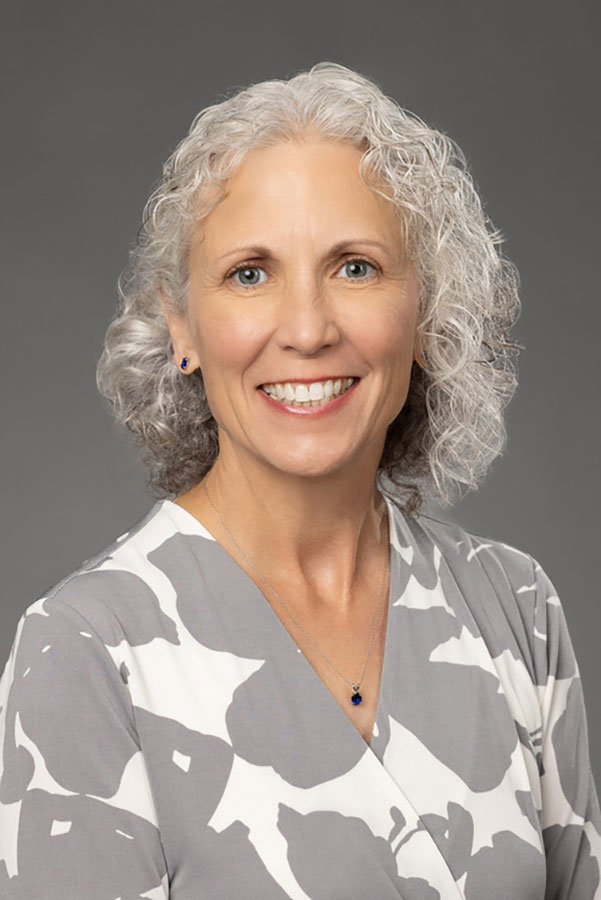
Mary E. Graham, Ph.D., professor in the Department of Sport Management, has been named Falk College Associate Dean of Faculty Affairs effective Jan. 2, 2024. This newly created leadership position reports to Falk College Dean Jeremy Jordan and is dedicated to faculty development and success. In this role, Graham will guide all Falk College efforts related to faculty development—from hiring to retirement—and work closely with university offices and leadership in Academic Affairs, University Counsel, Equal Opportunity Compliance, Human Resources, and Office of Research.
“I am excited to appoint Dr. Graham to this new role for Falk College,” says Jeremy S. Jordan, Dean of Falk College. “I am very confident that she will be able to further the support and development of our faculty based on her wealth of professional experiences and academic expertise.”
As Falk College Associate Dean of Faculty Affairs, Graham will work with department chairs to develop strategic hiring plans for faculty and oversee the successful execution of faculty searches. She will participate in faculty review processes, including recommendations for contract renewals and promotion and tenure, and manage operational aspects of faculty affairs. Together with Falk College leadership, Graham will steer the college towards enhanced faculty research and teaching excellence.
“Falk College has an exceptionally talented, diverse faculty with unparalleled dedication to the student experience and the creation of new knowledge,” says Graham. “I am honored to serve as Associate Dean of Faculty Affairs in service to my faculty colleagues and the linked missions of Falk College and Syracuse University. I look forward to collaborating with our visionary Dean, Jeremy Jordan, and his leadership team on strategic and operational faculty matters.”
Graham joined the Falk College faculty in 2012 and is also affiliated faculty in the Whitman School of Management. She teaches applied courses in organizational behavior and strategic human resource management, as well as diversity in sport organizations at the undergraduate, graduate, and executive levels. An expert in gender disparities in employment, she has conducted numerous American Association of University Women salary negotiations workshops for students since 2009.
In 2022, Graham was named Syracuse University’s faculty athletics representative (FAR) to the NCAA and the Atlantic Coast Conference (ACC). In this capacity she serves as a key advisor to Chancellor Kent Syverud and Provost Gretchen Ritter on policy proposals and issues affecting student-athletes’ academic and overall wellbeing, working closely with Tommy Powell, Assistant Provost for Student-Athlete Academic Development; Athletic Director John Wildhack; and their teams of professionals. Graham chairs the Faculty Oversight Committee on Athletics, which reviews student-athlete academic data and conducts exit interviews of departing student-athletes.
She previously served as a Syracuse University Provost Faculty Fellow from 2018 to 2020, where she worked with the Provost and University Senate to develop and implement campus-wide shared competencies for undergraduate students. Graham has been a University Senator since 2018, and she currently serves on the Senate Committee on Athletic Policy.
Prior to joining Syracuse University, Graham held faculty positions in business schools at Clarkson University, George Washington University, and Georgia State University. She has served as a visiting scholar at National Taiwan University of Science and Technology, National Central University in Taiwan, and at the Federal Reserve Bank of Atlanta. She also has prior work experience with several members of the U.S. House of Representatives. Graham has published extensively and has been widely cited in the areas of human resource management (HRM), public policy and employment discrimination, gender in employment and HRM in supply chains. She is currently studying the equal employment opportunity transparency among professional sport teams, and the impact of concussions on player misconduct.
Graham is on the Editorial Board of the journal Human Resource Management (Wiley), where she previously served as an associate editor. Her professional memberships include the Society for Human Resource Management; and the Academy of Management, where she serves on the executive committee of the Research Methods Division.
A former CPA, Graham has a B.S. in Accounting from Le Moyne College and work experience in public accounting and human resource management. Graham earned both her M.S. and Ph.D. degrees in Industrial and Labor Relations from Cornell University, specializing in human resource management, organizational behavior, and gender studies.
Start the Bidding
The 19th Annual Charity Sports Auction, presented by the Sport Management Club at Syracuse University, will be a hybrid auction with bidding opening online via OneCause on Nov. 24 and continuing Nov. 28 at the Syracuse men’s basketball game against Louisiana State University (LSU). Online bidding will close on Wednesday, Nov. 29. The Sport Management Club includes students from Falk College. Club members are responsible for collecting the sports items available during the auction, reaching out to athletes, agents and organizations in search of donated goods.
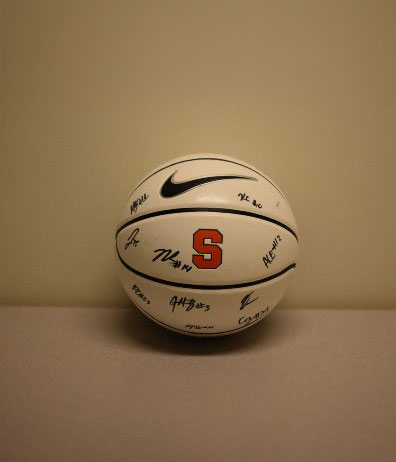
This year’s beneficiary is Tillie’s Touch, a not-for-profit organization founded by Dale Johnson in 2008 to help youth overcome barriers and maintain a 100% high school graduation rate. The organization’s goal is to make an impact in the lives of Central New York youth, provide opportunities to play sports and help children achieve academic excellence. Tillie’s Touch serves 1,500 youth annually.
Over the past 19 years, the Sport Management Club has raised over $665,000 for Central New York nonprofit organizations. Featured items this year include a Super Bowl football signed by Tyreek Hill, a Ichiro Suzuki signed baseball and Buddy Boehiem signed basketball, among other items.
To further the auction’s mission of community impact, Apex Entertainment is this year’s title sponsor. “We are really proud to work with Apex Entertainment for another year. They were amazing to work with last year, and we look forward to working together again to raise money for Tillie’s Touch,” says auction co-chair Jacob Geisinger.
The 19th Annual Charity Sports Auction will take place in the backcourt of the JMA Wireless Dome as the Syracuse Orange take on LSU in front of tens of thousands of dedicated fans and the Syracuse community.
Visit sucharitysportsauction.com or follow the auction on Twitter, Facebook and Instagram for the most up-to-date event information. To register for online bidding or make a monetary donation, visit the Charity Sports Auction website.
An SU News story by Sport Management major Zach Roth ’24 originally published on Nov. 16, 2023.
Power of the Entrepreneurial Spirit
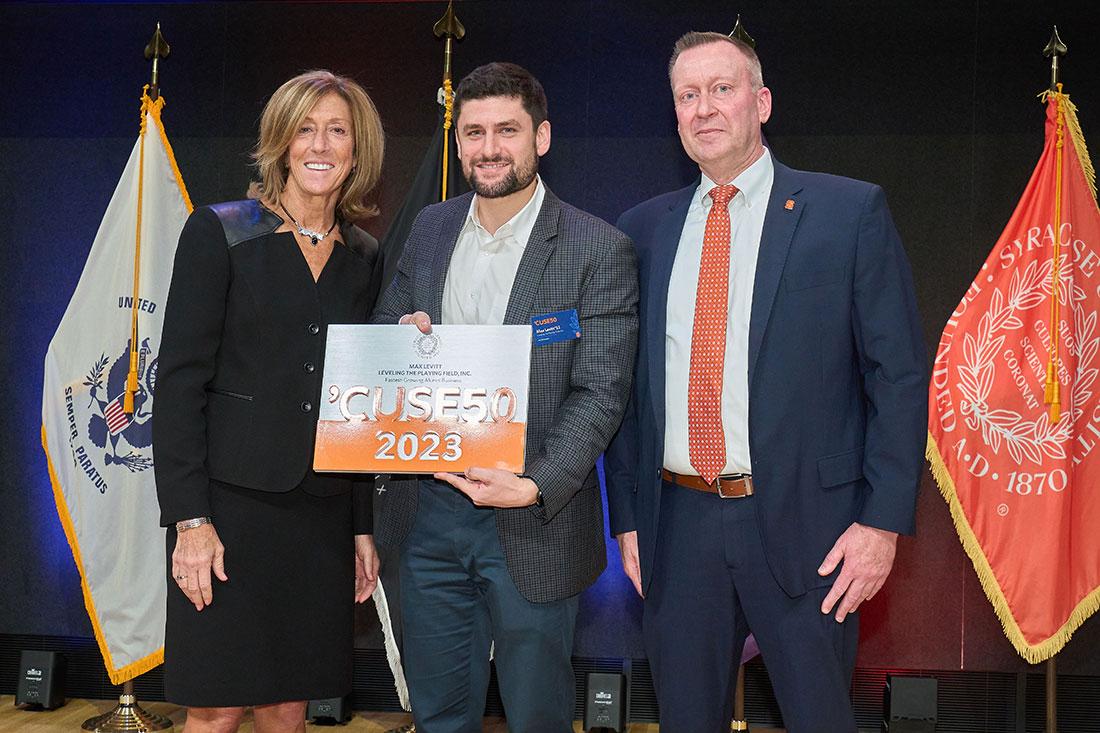
The power and impact of the entrepreneurial spirit was on center stage during two recent alumni events on campus. First, on Nov. 9, 50 of the fastest-growing Syracuse University alumni-owned businesses were honored during the inaugural ’CUSE50 Alumni Entrepreneur Awards.
At the awards ceremony held at the National Veterans Resource Center at the Daniel and Gayle D’Aniello Building, J. Michael Haynie, vice chancellor for strategic initiatives and innovation and executive dean of the Whitman School kicked off the evening. “I am an evangelist for entrepreneurship. Entrepreneurship is about empowerment,” said Haynie. “I know this because the work that I do has afforded me a front row seat to see how entrepreneurship can change the trajectory of lives.”
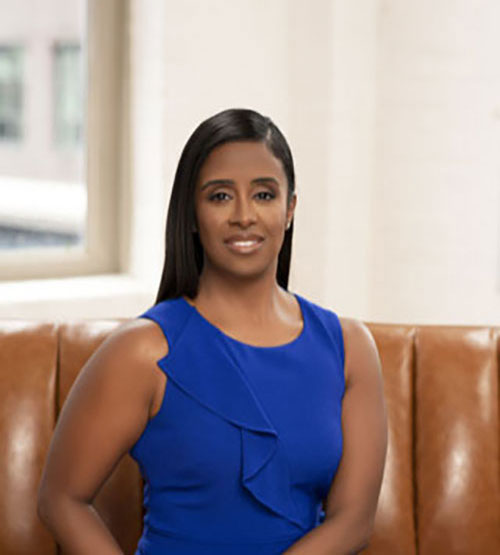
Ball stressed to her fellow honorees the importance of extending a hand and opportunity to the next generations of awardees. “Whether hiring current students as interns or donating to scholarship programs, like Our Time Has Come, spearheaded by the Office of Multicultural Advancement, let’s ensure the success of future generations,” said Flowers-Ball.
The following day, the alumni gave back to the community that they so proudly came from by taking part in the ’CUSE50 Summit. The summit was open to the entire campus community, but specifically targeted students to allow them to learn about startup thinking, to develop personal and professional skills and to meet and network with alumni founders and top executives of fast-growing companies.
The day started with welcome remarks from Haynie and Alexander McKelvie, interim dean of the Whitman School of Management and professor of entrepreneurship. McKelvie thanked the alumni panelists for paying it forward to the next generation. “Each of you likely remember that one friend, mentor or role model who helped inspire you and think differently about how you approach a challenge,” said McKelvie. “Today is about that same inspiration.”
Entrepreneurship certainly changed the lives of many alumni honored during the ’CUSE50 awards. This was showcased during the interactive panels with the honorees and more than 300 students during two different sets of sessions of the ’CUSE50 Summit. Topics included developing entrepreneurial and growth mindsets, community building and customer acquisition, branding, finding talent and developing teams, mental health and the startup life, finding advisors, mentors and coaches, and setting yourself up for success by raising money and leveraging resources.
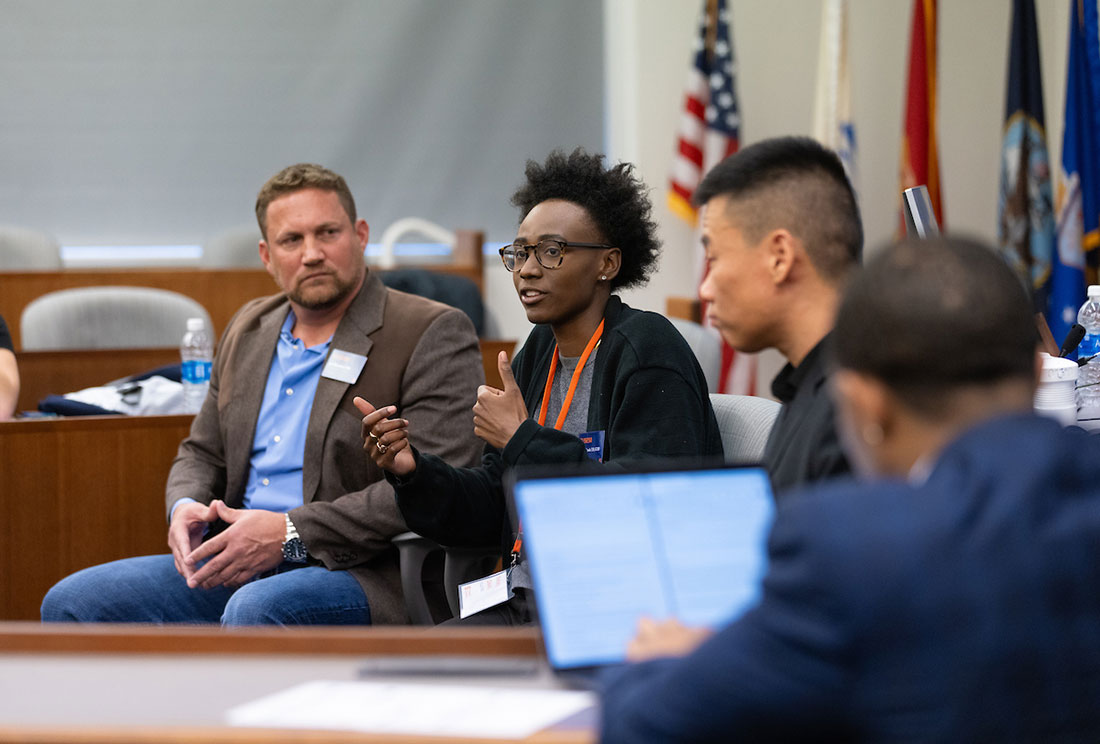
When asked what advice they would give to young entrepreneurs who are hoping to start and/or grow a business, here’s what a few of the ’CUSE50 winners had to say:
“Never stop asking questions. Seek advice at all turns. Every business can be improved and the key for entrepreneurs is to identify the opportunities and fill the need. It is also normal to fail, regroup and try again.”—Adam Sulimirski ’85, managing partner of ICON EV Cruise Car
“Work for either an entrepreneur or an entrepreneurial-oriented organization for a bit after college to learn the good, the bad and the ugly. Learn what works and what you like and build your business around those values. You will attract like-minded people who share your passions, and you will love coming to work every day.”—Frank Shultz ’03, CEO and founder of Infinite Blue
“Embrace every learning opportunity, even if it seems unrelated to your primary field of study. Skills and knowledge acquired in one area can often be applied in unexpected ways in another. Stay adaptable, be open to change, and always prioritize effective communication. Surround yourself with a diverse team that brings different perspectives and strengths to the table. Also, be mission-driven and seek inspiration from the brands, companies, and causes you work for. Aim to inspire others to achieve bigger and better things than they can do alone.”—Whitney Mitchell ’06, CEO and founder of Beacon Digital Marketing
“Just start building and don’t be afraid to fail because the failure is putting you one step closer to achieving your ultimate goal.” —Kori Hale ’13, CEO of CultureBanx
An SU story by Christine Weber originally published on November 14, 2023
Forever Orange
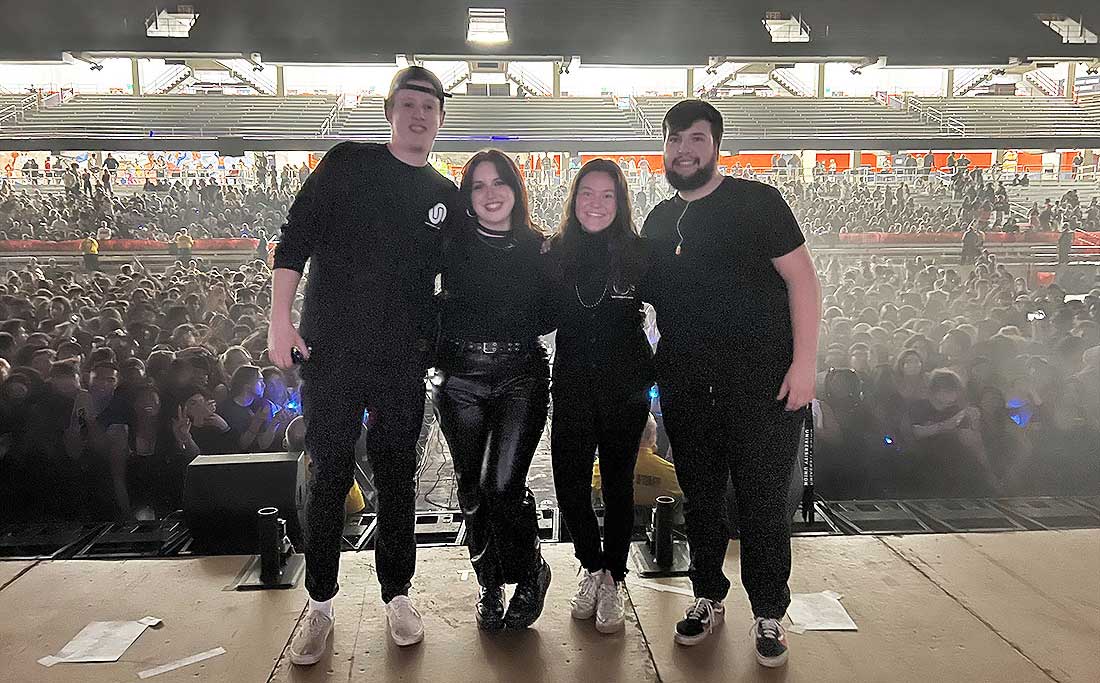
Molly Gross is proof that it’s never too late in your academic career to change your career goals.
In the spring of 2022, Gross was set to graduate with a public health degree. She was a work-study student in the Falk College admissions office, and Director of Admissions Deborah Golia asked Gross if she was excited about graduating and starting her career.
“I said, ‘Actually, I don’t know.’ I was stressing a little bit because I didn’t know if that’s what I wanted to do anymore,” Gross says.
Gross had more conversations with Golia and her staff and told them she had enjoyed organizing concerts as a member of the University Union.
“With Molly’s public health background, she initially considered a PA (physician assistant) program for graduate school,” Golia says. “However, during her time at Syracuse University, she was involved with the student union organizing events, where she realized her passion was in live music and events.
“She contemplated finding a job and then potentially pursuing graduate school,” Golia adds. “But as a student employee in the Falk admissions office, we kept driving her to consider the Forever Orange opportunity.”
The Forever Orange Scholarship provides half the tuition for students who enroll full-time in a qualifying graduate degree or certificate program at Syracuse University. The scholarship is automatically available to graduating seniors who are eligible for admission and commit to attend graduate school immediately after graduation.
Golia connected Gross with Michael Veley, director and chair of the Department of Sport Management at Falk College, who met with Gross to discuss the department’s one-year Sport Venue and Event Management (SVEM) master’s program.
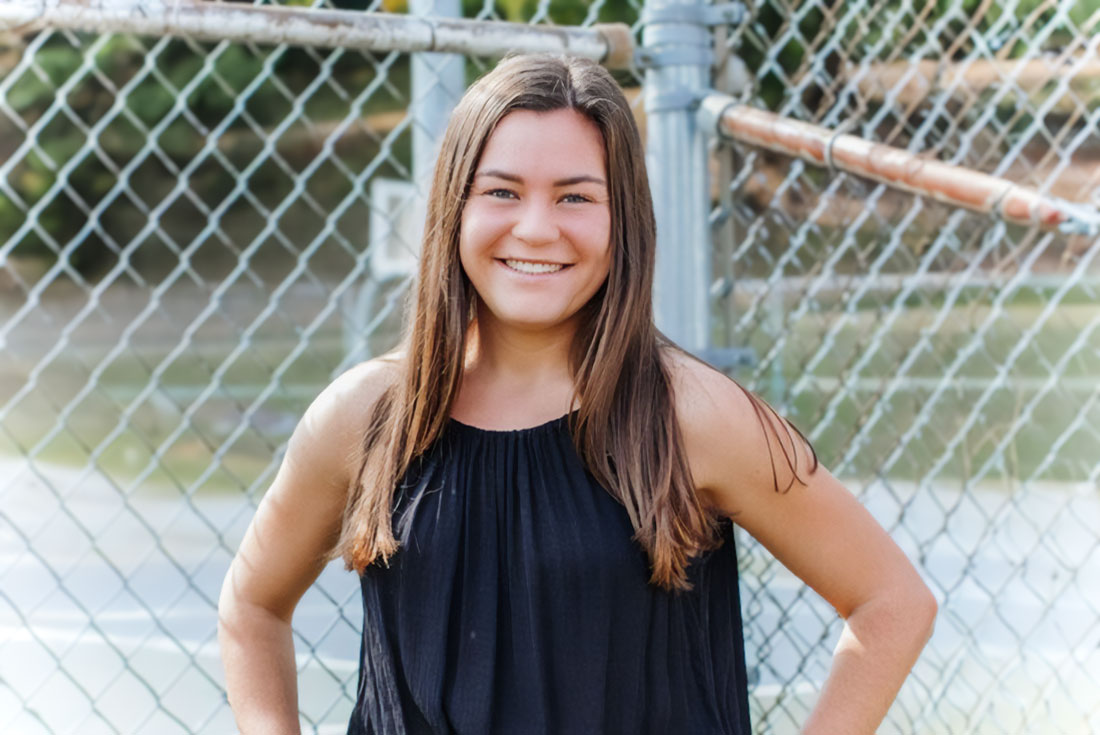
“I talked it over with my parents and the (Forever Orange Scholarship) was a large factor because I don’t know if I could have gone without it,” Gross says. “I looked at the (SVEM) program and the connections it has and the value it brings that could help me learn more about the industry and help me get more exposure and progress faster in that career.”
Gross’ decision was a smart one as she received the 2023 Outstanding Graduate Student Award from the Department of Sport Management and is now the event manager for the Oak View Group entertainment company based in Atlantic City, New Jersey, about an hour’s drive from her hometown of Cinnaminson, N.J.
We recently caught up with Gross to talk about how her passion for the live music industry developed at Syracuse University, the value of her public health degree, and her new position coordinating live events. Here’s that conversation:
Q: You entered Syracuse University as a biology major but then switched to public health as a sophomore. What prompted that change?
A: I took one (public health) class in the first semester of my sophomore year, and it was a service-learning class where we worked with an organization in Syracuse (Vera House) and helped them in any way they needed and produced a project out of it. The class was really engaging, and after that class I switched over to public health because I was thinking that maybe I’d go to the medical side and PA school.
I didn’t really think about staying at Syracuse (for graduate school) or switching to the event side until the end of my senior year. I was vice president of the University Union, and in high school I never had exposure to the entertainment world to even know that was what I wanted to do. Syracuse gave me the opportunity to learn so many different things and working with UU was an experience that really formed where I am now.
Q: Where did you get your love of live music?
A: Where I grew up, there’s the River Line (train) that would take us to Camden, New Jersey, and we would go to what’s now called the Freedom Mortgage Pavilion. They would have concerts all summer and my friends and I would go no matter who was performing. I always liked being in that environment; I love seeing people attend events and get excited and follow their favorite performers.
Q: You started the SVEM program in July of 2022 and worked closely with the staff at the JMA Wireless Dome. What was that like?
A: Both in the Fall and Spring semesters we had (Dome Director) Tom Forgione and (Associate Director) Tom Benzel as professors and it was great to hear about their experiences because they have worked in so many positions and places within the entertainment industry and in the Dome.
In the Fall semester, we had a ‘secret shopper’ event where Tom gave us tickets to a basketball game and we acted as if we were spectators, but we were really observing the environment. How were the security lines? How were ticket takers and concession staff interacting with guests? How clean was the area? So, we were thinking critically about our experience and reporting back to him.
Q: Did the program involve any additional experiential learning?
A: The way the program was structured, it was as much about the experience you gained outside of the classroom as inside. We had projects where we reached out to network with people; looked into different jobs that we wanted to potentially hold one day and what path could get us to that; and made phone calls to ask other people about their different experiences in the industry.
I worked in the (Syracuse) Oncenter box office, Syracuse amphitheater, and with the operations team in the Dome, I felt like they were always encouraging us to use our time outside of the classroom as wisely as possible. It was always in the back of my mind that if I was going to spend this money and time in this program, I was going to make the most of it. I was going to spend every second trying to gain as much as I could, whether it was working this event at the dome or that event in the community. It’s always shown me that it comes back around and the experiences I had with those things did help me later.
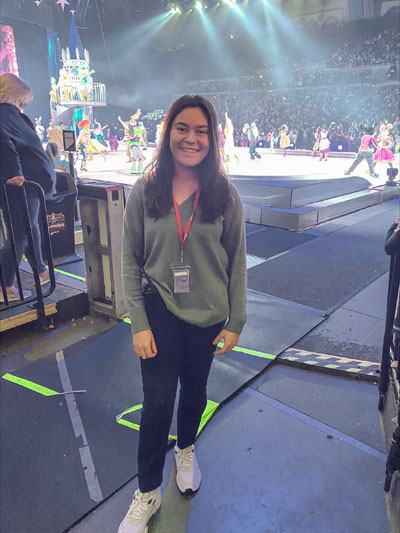
Q: What are you doing in your current position in Atlantic City?
A: SVEM has us do a nine-credit practicum and I did that in the summer (of 2023) as an event coordinator at the Convention Center and Boardwalk Hall in Atlantic City. I was recently promoted to event manager, and I work between the client and the building to make sure they have everything they need, whether that’s setting up, connecting with food and beverage, or their internet and AV (audio-visual) needs.
At the Convention Center, our clients are conventions, trade shows, meetings, and luncheons. At Boardwalk Hall, it’s concerts, indoor auto racing, Disney on Ice and events like that. I go from working a convention from 7 to 4 on a Monday to working a concert on Friday night. I really like that about my role; I’m getting to see it all.
Q: What role does your public health background play in your career?
A: The general manager where I work right now is put in situations where he has to make decisions or plan for situations that you might not ever think you had to, like he was leading a lot of the decision-making when COVID hit and had to decide certain plans and procedures for the company and the venue. I hope to get to one of those positions one day and I think that what I learned in the public health program at Syracuse will always be valuable.
And whether I use it in my career or not, it’s also been valuable to my life in general, understanding the complexities of health and the world. There were so many classes where we talked about the social determinants of health and how everybody is experiencing different things that affects their health. Understanding that diversity helps no matter what you’re doing.
Q: What would you say to other students who may be in the position that you were in as they approach graduation?
A: Always have the conversation. If you’re not happy where you are, talk to an advisor and have that conversation. With how the majors are structured, time is limited, so I would act on it sooner than later. I know if I’m feeling that way, I’d rather act on it than regret it later.
I don’t think any decision is final. Just because you make a decision now doesn’t mean everything is closed off forever.
Invisible No More
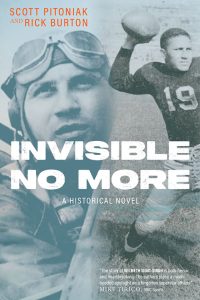
What if one of the greatest student-athletes in Syracuse University’s storied history—its first Black sports star—was one of the world’s least-known legends? Wilmeth Sidat-Singh ’39 is partially recognized within the University community, but his full story hasn’t ever been told—until now, thanks to two Newhouse School of Public Communications alumni. It’s a tale that involves a former Orange football and basketball standout who dies tragically during World War II.
This year marks the 80th anniversary of Sidat-Singh’s death, which occurred a year after his entry into the U.S. military. Following rigorous testing, he joined the elite Tuskegee Airmen. His P-40 fighter went down during a training mission in 1943, killing the young airman, just four years after earning a bachelor’s degree from the College of Arts and Sciences.
Sidat-Singh’s life and legacy was recently honored during an event at the National Veterans Resource Center at the Daniel and Gayle D’Aniello Building (NVRC), marking the 75th anniversary of desegregation of the U.S. military.
Even so, much of Sidat-Singh’s life remains undocumented. Award-winning journalist and author Scott Pitoniak ’77 and Rick Burton ’80, the David B. Falk Endowed Professor of Sport Management in Falk College, have written a years-in-the-making book that fills in the blanks of Sidat-Singh’s extraordinary but largely forgotten life.
Predicated on extensive research and interviews, their historical novel, “Invisible No More,” recently was published by Amplify/Subplot and is available online and in bookstores. The book was unveiled during the NVRC event, at which both authors discussed this remarkable student, athlete and veteran.

You wrote about Sidat-Singh in “Forever Orange: The Story of Syracuse University.” What fascinates you most about his life?
Pitoniak: I think we were intrigued by what an incredible person he was on so many levels. The more interviews and research we conducted for “Forever Orange,” the more layers we discovered.
Wilmeth truly was the greatest athlete many people never heard of. We could have produced a book solely on his athletic achievements, which were astounding. He was a quarterback compared to the Tom Brady and Peyton Manning of his day by the most influential sports media member of the times (sportswriter Grantland Rice). He was a superb basketball player, whom his peers from the 1930s and early ’40s said would have wound up in the Basketball Hall of Fame had he lived. He was a pre-med major who dreamed of following in both his father and stepfather’s footsteps and become a doctor.
On top of that, he was a courageous man who paid the ultimate sacrifice. And he gave his life for a country that didn’t consider him a full-fledged citizen because of the color of his skin. He overcame numerous racist obstacles along the way, and truly was a trailblazer for the Black quarterbacks who followed in his footsteps years and decades later.
Burton: He really was a great young man, not only a generational athlete with talent beyond reproach, but just a great individual, too. Everything you would want in a doctor, a teammate, a friend. In a different generation, he could have been a great leader, perhaps even president. What he had to overcome, including hiding his identity, was simply incredible.
You mention his story has largely been untold. Why?
Burton: That’s partly due to the racist times in which he played. During that period, athletic awards typically weren’t given to African American athletes. Then, when he died in 1943 during that training mission as a member of the Tuskegee Airmen, he literally disappeared and was forgotten. It was at the height of World War II when many soldiers perished daily and one individual death did not receive much attention. It’s so hard to keep one’s legacy alive when they’re gone, and, unfortunately, it’s not until much, much later that we began to realize the generational talent we had in Sidat Singh.
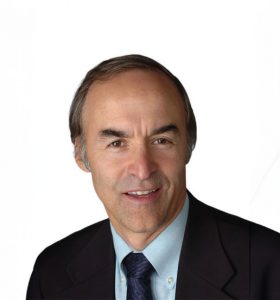
It’s important to note this is a historical novel and not a biography. Was there a reason you approached it in this manner?
Burton: While we would have loved for this to have been a biography about a great young student-athlete, the reality is that most of his peers and family are no longer with us, which meant we had to really dig to provide a realistic account of his life.
During his playing days, there wasn’t much material in terms of newspaper quotes or even any letters describing his innermost feelings. This was in an era when reporters typically did not quote Black athletes, so press coverage was thin.
We wanted to get into his head. What was in his mind? What might he have been thinking? We piece this together through interviews with people who knew him, including surviving distant relatives, players and coaches. We created a fictional sports reporter who stumbles upon his story. She is a composite character of people Scott and I knew and worked with, and she and Wilmeth serve as parallel protagonists.
I need to reinforce that this is historical fiction. We are not trying to portray this as perfect history. We extensively studied his life in order to put this story together in an historically accurate way. It’s rooted in reality.
How do you make sure your work is indeed rooted in reality?
Pitoniak: Both Rick and I have worked as sportswriters at daily newspapers. We ultimately decided to create a female sports writer as a prominent character to drive the narrative. We wanted someone who was facing challenges and roadblocks similar to Wilmeth’s while trying to break into a predominantly white, male field.
She uncovers Sidat-Singh’s story and immerses herself into it. She digs and digs and digs and finds all these different pieces. Because it’s fiction, we can jump back in time and get inside Wilmeth’s head and soul. It was a lot of fun for us to put this together, but more importantly, to help shine more light on Wilmeth’s fascinating life.
Though it takes place nearly a century earlier, we believe it’s very much a 21st century story—a story we hope will inspire people facing similar, daunting challenges. As the title says, we wanted to try to make sure Wilmeth was invisible no more.
About ‘Invisible No More’
From the publisher: “Wilmeth Sidat-Singh is the greatest athlete you’ve never heard of. In addition to having a laser for an arm on the football field and electric moves on the basketball court, he was also a scholar, civil rights pioneer, patriot and one other thing—forgotten.
“In this historical novel based on Sidat-Singh’s life, sportswriter Breanna Shelton inadvertently comes upon the compelling life of a Syracuse University phenom who generations earlier had to hide his identity in order to play, then was forced to deal with the backlash amid the tension of race and sports in 1930s America.
“As an aspiring Black woman building her career in a profession that doesn’t embrace her, Shelton finds a kindred spirit. She buries herself in research, committed to resurrecting an inspirational man whose name was long lost. In the process, she discovers courage and fortitude to transform herself and her goals.
“Post–civil rights era society still wrestles with stiff obstacles that Sidat-Singh faced when he was “passing” to get on the field; flying as a Tuskegee Airman in World War II; and interacting with celebrities of his day, including Duke Ellington, Cab Calloway, Grantland Rice, Sam Lacy and Joe Louis.
“This fictionalized account, as timely now as ever, honors an American hero whose life ended too soon serving a country that didn’t see him as a full citizen because of the color of his skin. After you read this book, Sidat-Singh will be invisible no more.”
An SU News story by Keith Kobland originally published on Nov. 1, 2023.
Page 9 of 37
